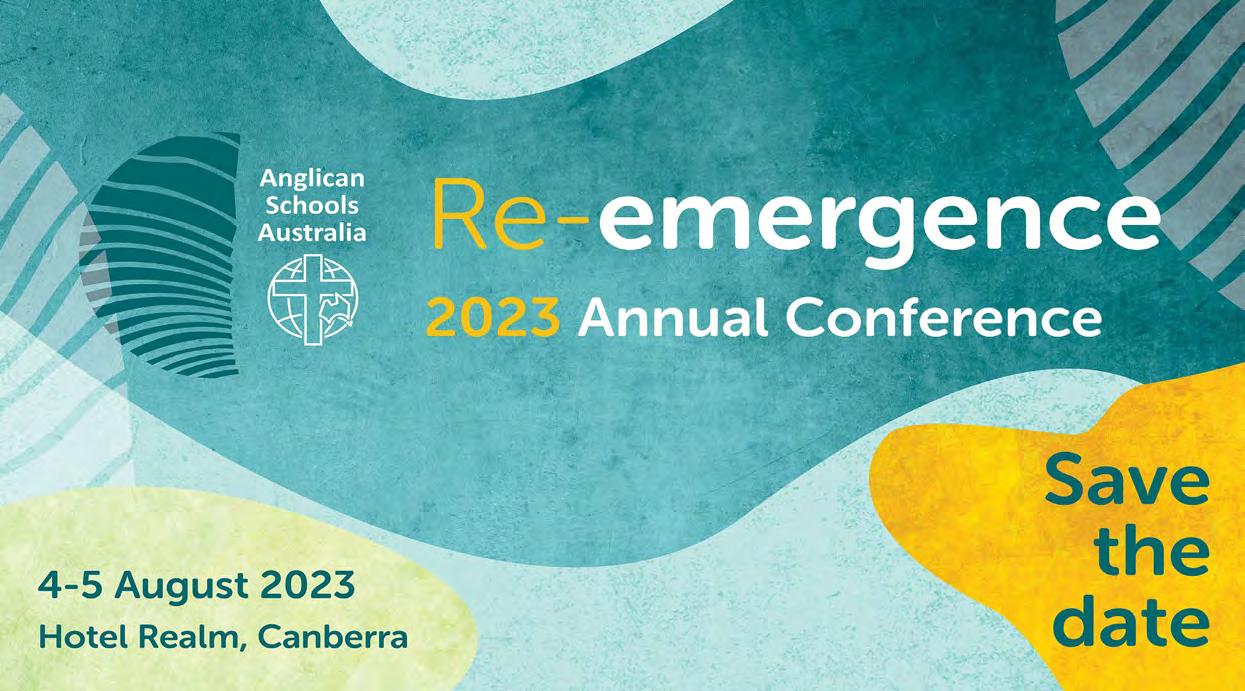









The role of President of Anglican Schools Australia (ASA) during the last three years has certainly been challenging. With no opportunity to meet in person at one of our annual conferences or even within some states, our connections were nurtured through print, zoom and video – together, apart.
It takes a compassionate and persistent leader to support their community during such a time, and in addition to her own school community, St Mary’s Anglican Girls’ School, Judith Tudball led ASA during this time of change. I want to thank Judith, our President from August 2019 until August this year for her dedicated service and I am grateful that she remains on the Management Committee as Immediate Past President. At our AGM we also welcomed Rob McEwan from The Hutchins School in Tasmania as President Elect and I am looking forward to working with them both in their new roles.
Our annual conference this year, Lifted in Spirit, was certainly a highlight. In addition to our organising committee led by Judith Tudball and Peter Laurence, I would like to thank members of our community who hosted the virtual programs in their schools or other central locations to ensure a shared and inclusive experience. The conference program provided opportunities for inspiration and celebration as we engaged with speakers, panels and video footage highlighting the expression of our Anglican identity in our schools. We have so many stories to share and to celebrate as an inclusive Anglican community!
I vividly remember my first visit to Camberwell Girls Grammar School (CGGS) after I had been appointed Principal. The feeling has remained with me over the years as one of being truly welcomed into a community – yet in reality I only met a small number of students and staff at that time. Visitors to our school have often made similar comments to me; one even described their feeling of an ‘invisible thread of connectedness’ throughout the school. I have no doubt that many of you can share similar stories.
In our Anglican identity work with The Reverend Dr Daniel Heischman in 2018, he highlighted six themes, one of which was inclusion, and I have often thought about his statement that inclusion is both a reality and a goal of Anglican schools. The diversity of students at CGGS is similar to other Anglican schools close by. Our students come from many different cultural backgrounds,

and as well as our Christian families, we welcome families from a range of faith communities - Buddhist, Hindu, Islamic and Jewish - as well as families who do not take a faith perspective.
Most parents I speak to say that the lived values of the school – being inclusive, respectful and welcomingare a key part of their reason for selecting our school.
The Most Reverend and Right Honourable Stephen Cottrell, Archbishop of York reminded us at our recent conference, that these values are brought together by our beliefs and practices, and are the ‘genius of our faith’.
As is often said, it is in the challenging times, rather than the good times, where true character is revealed. The Archbishop of York reminded us that in our work we have been called to be “courageously inclusive and to disagree well”. This is a challenge that we all face in a society where so many people are currently leading highly pressured lifestyles. It has also been exacerbated by the impact of the global pandemic where we might more often experience people with ‘shorter fuses’, a reality that means we have limited time to understand each other and then to resolve our differences, or agree to differ!
Our faith will continue to shape how we address these challenges in our schools, supported by our important work on Anglican identity. As the Archbishop of York recently encouraged us all: live like Jesus – with kindness, generosity of spirit, integrity, inclusion and in service to others.
May advent be a time of hope, peace, love and joy for you and your school communities.
Mrs Debbie Dunwoody President, Anglican Schools Australia Principal, Camberwell Girls Grammar School
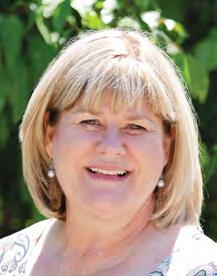
The word ‘inclusion’ is so much part of everyday life in an Anglican school in the 2020s. Many schools even have positions of responsibility dedicated to Deans or Directors of Inclusion and Diversity. The word covers so much of what is done in a school, because Anglican schools are truly inclusive and diverse communities where all are welcomed, and where hospitality is given to every student, regardless of their ability, ethnicity, gender, sexual orientation, religion or ideology. This is not necessarily so for all faith-based schools.
We are currently putting the finishing touches on our new Strategic Plan, ready to launch it in late February next year. As part of the Strategic Plan’s development, the Management Committee focussed on ASA’s core values. The Plan that has served us so well for the past five years or so spoke of six core values: Service, Inclusivity, Integrity, Courage, Justice and Generosity of Spirit. While all remain valid for tomorrow as much as they were yesterday, Management Committee has sought greater clarity and brevity in this space.
Mrs Dunwoody is the Principal of Camberwell Girls Grammar in Victoria and brings to the position a wealth of experience in Anglican and independent schooling. She has been a long-time and strong supporter of ASA. I look forward to working with Mrs Dunwoody to further ASA’s goals of serving and supporting Anglican schools.
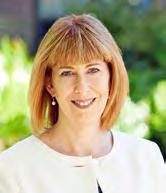
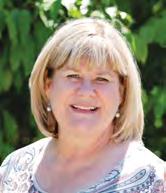
We have set on a new Core Values Statement: “Inspired by Christ, we embrace SERVICE, INTEGRITY and INCLUSION.”

Any organisation, business or school is held accountable to its values… not only as they are proclaimed but more importantly as they are lived. How appropriate that this edition of ASA News focuses on inclusion, one of our core values for yesterday, today and tomorrow.
It is my pleasure to welcome Mrs Debbie Dunwoody as our President for the next three years. A smooth handover from Mrs Judith Tudball occurred at our August Conference, with both being in the Perth studio from where the virtual conference was hosted. Our deep appreciation was expressed to Mrs Tudball, who served as President right through the pandemic, commencing only some six months beforehand. We were well served indeed by a passionate and experienced Anglican principal, whose dedication to ASA for many years has been unwavering. Thank you, Judith!
Speaking of the Conference, it proved to be a great success, even though we were still virtual! Outstanding speakers were enjoyed by delegates across the country, most of whom were in local hubs across our capital cities. The hubs were very well received, connecting colleagues within each state and territory. Thanks to Mrs Judith Tudball and the WA-based organising committee.
It’s our hope that this will be the last virtual conference. Next year we will come together at the Hotel Realm in Canberra on 4th and 5th August, with the Chaplains’ Networking Day and Leading in an Anglican School Day on Thursday 3rd August. Please mark your diaries. Mrs Fiona Godfrey and the ACT-based organising committee are well underway with a program so well suited to what will be our first national face-to-face gathering in four years. The theme of ‘Re-emergence’ is apt!
At the 2022 Conference, the newest Life Membership was awarded to Dr Mark Sly, Principal of Coomera Anglican College in Queensland. Life Membership is a special form of membership which may be bestowed upon any person
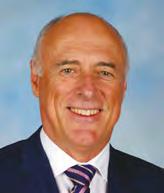

Mr Dale Bennett, Launceston Grammar School, TAS (effective 2023)
Mr Gerard Houlihan, St Michael’s Grammar School, VIC
Dr Deborah Netolicky, Walford Anglican Girls’ School, SA (effective 2023)
Ms Cherylyn Skewes, St Peter’s Girls’ School, SA (effective 2023)
Mr Jordan Smith, Esperance Anglican Community School, WA (effective October 2023)
Mrs Virginia Warner, St Luke’s Anglican School, QLD (effective January 2023)
Mr Craig Merritt, St Luke’s Anglican School, QLD (effective December 2022)
whose services to Anglican Schools Australia have been sufficiently meritorious, having contributed to ASA for at least ten years. Further, Life Members must have attended at least 10 ASA annual conferences.
Life Membership is the highest recognition that can be awarded in acknowledgement of exceptional service and contribution. Nominees are considered individually and on their personal attributes, achievements and overall contribution to ASA.
This year, Dr Sly retires after 27 years leading Coomera Anglican College, as their Founding Principal. He served on our Management Committee from 2014 and as President from 2017 to 2019. He also chaired the Organising Committee for the very successful 2017 Brisbane Conference. A truly outstanding educator and most worthy recipient of Life Membership.
FINALLY, as we approach the end of another school year, it reminds us that the Church’s season of Advent is on our doorstep. It’s a time when the ‘Christmas’ story is retold across Anglican schools, through Nativity Plays, Festivals of Lessons and Carols, and through all other manner of worship.

We pause to reflect on the birth story of Jesus. Miraculous in its nature, it is a story of hope for all of humanity. For each person, it’s a story that reminds us of a God who broke into our world, coming in human form to live among us. What a marvellous love story it is. It reminds us that God does understand what we go through in our daily lives, because God lived it too.
Advent blessings to you all.
The Reverend Peter Laurence OAM Chief Executive Officerwww.anglicanschoolsaustralia.edu.au

Anglican Schools Australia invites principals, chaplains and teachers, as well as chairs, governors and friends of Anglican Schools to submit articles for publication in ASA NEWS. We are particularly interested in publishing articles about school Religious Studies, Service Learning and Indigenous programs. We welcome submissions of feature articles of approximately 750-1000 words and news articles of 350 words, together with a selection of high quality digital images of 300 dpi. Please email submissions to media@anglicanschoolsaustralia.edu.au Submissions are published at the discretion of the Editor.
Cover Images:
Main image - Melbourne Girls Grammar Early Learning students retelling the story of Christmas through song and narration at their annual Chapel of Celebration P.18 Inset - Head of Trinity College releases their Cultural Safety and Inclusion Enrichment Plan P.14

ASA’s new President Debbie Dunwoody comes into the role after joining the ASA Management Committee in 2016. Debbie has held diverse leadership positions during a career in education spanning more than 35 years. She is the current Principal of Camberwell Girls Grammar School in Melbourne.
Where did your career in education start?
I was a Science teacher and took on the role as Head of Science for Prep – Year 10 at the Glen Waverley campus of Wesley College in my 3rd year of teaching. My second appointment was as the inaugural Director of MLC Marshmead, a remote campus of Methodist Ladies College in Melbourne. It was a residential position for a program located on a property in the middle of Croajingolong National Park. Students attended for eight weeks, and the program was focussed on environmental education and the history of the area.
When did you start moving in leadership positions?
In my third year of teaching at Wesley College. I then moved to the main campus of MLC in Melbourne, I held a number of different roles over the next 18 years, including Head of Middle School, Vice Principal and Principal in a fixed term position. My current role is Principal of Camberwell Girls Grammar School, which I have held since April 2014. I’ve always been the type of person who loves working with others to do new things and as a result I’ve held leadership roles for most of my professional career.
Why is ASA an important organisation for Anglican schools?
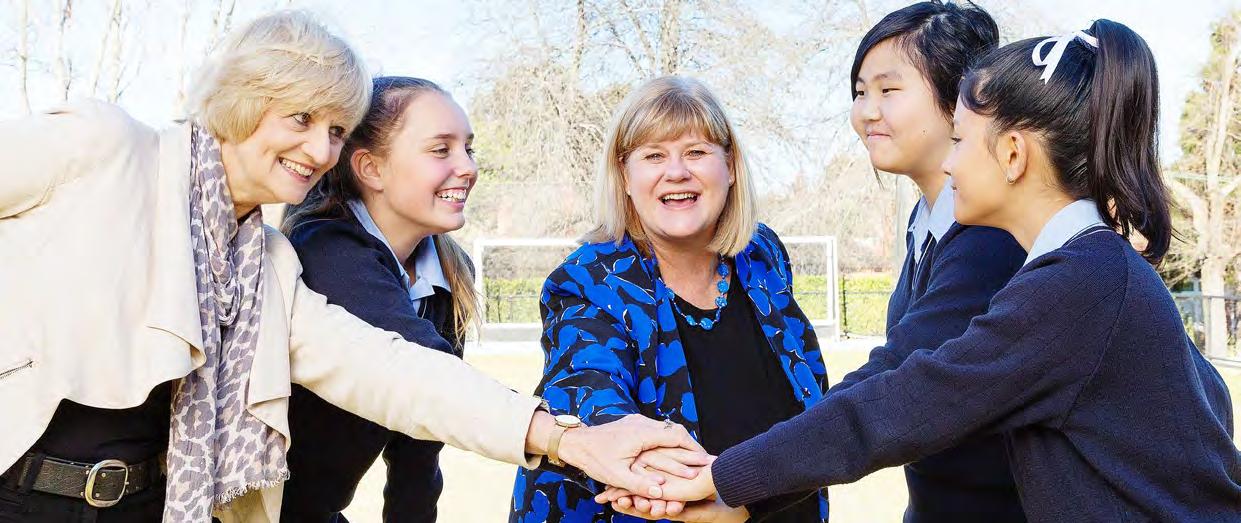
ASA brings key leaders, members of governing bodies and staff together to know and support each other in our work in shaping and living our Anglican identity in our schools. This is important because it helps us to continue to develop shared language about the uniqueness of
Anglican schools and it gives us opportunities to share and celebrate what we most value.
What do you see as your role as ASA President?
To provide support for our CEO and members of our Management Committee to continue as a motivated and committed group in our Core Purpose which is ‘to serve, support and connect Anglican schools in living their Anglican Identity’.
What are some of the priorities for ASA over the next three years?
To me our Strategic Plan is vital in providing a focus for our work and I am very excited that we will be launching our next plan early in 2023. This has been a significant project for our Management Team as we have sought to not only update it but make our objectives more accessible to our member schools.
I am very keen to explore more ways for our schools to connect in person or virtually to share resources, programs, networking and professional learning opportunities to enhance our Anglican Identity. It is important that we continue to support the recruitment and professional development of our Chaplains and to continue to develop our engagement with the Anglican Church and Agencies as well as Government, Industry and Business to expand our voice and foster opportunities for the benefit of our schools.
What should schools know about ASA?
That in this complex world in which our schools operate, ASA is their national peak body to assist them by providing support and connecting them with other Anglican schools to help live their Anglican Identity. We are continuing to explore ways to assist in the development and sharing of resources and we celebrate our schools and share stories through publications, our website and social media. We are keen to connect with more schools and work with you to provide inspiring and helpful learning through our conference and publications.
What is your vision for ASA moving forward?
To deepen our engagement with staff from member schools by being able to provide a broad range of resources and professional learning in a sustainable way. One step at a time we move closer!
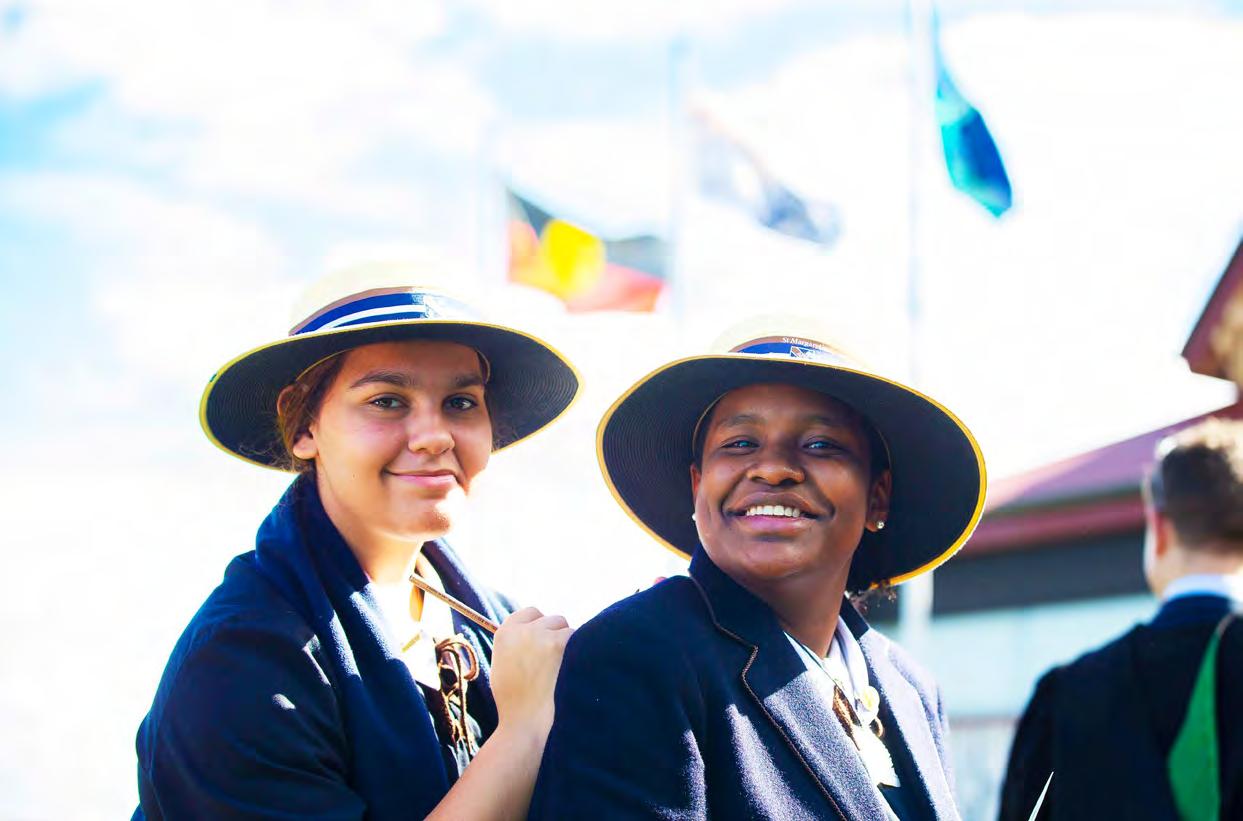
Most schools espouse certain values. They shape our expectations of members of the school community, and they represent the deepest beliefs and sentiments to which all members of the community can aspire. Given the influential roles of schools on students over a long period of time, values that help students adopt appropriate behaviours are an important part of their education as citizens of good character.
At St Margaret’s, our core values are the foundation of the nature of the interactions in the school, and they are educative.
St Margaret’s has had a long history of using its values to help communicate our school’s story – its mission, standards, and desired outcomes. Promoting these ideals provides the foundation for building the type of school climate we wish to foster. These values reflect the standards and the ways of thinking informed by the Philosophy of the school’s founders, the Sisters of the Society of the Sacred Advent.
In 2021, we embarked on a substantial community consultation with staff, parents and students to explore our school values and their currency in today’s age. The results of this ‘temperature check’ showed a remarkable alignment of key stakeholders with the current school values and provided a ringing endorsement for them in the school context.
However, the value Faith, although still ‘scoring highly’ was overtaken by Inclusivity. In today’s world, being overt in our teaching of inclusivity is more important than ever, but for our school, simply replacing Faith with Inclusivity was not an option until it was decided that all our values sit on the bedrock of our Christian Faith and that the Faith dimension needed to be reflected more in each value’s descriptor rather than being a stand-alone value.
The value of Inclusivity at St Margaret’s for example, is described as follows: ‘A St Margaret’s girl knows that every single person reflects the image of God and deserves to be treated with dignity. She demonstrates inclusivity by acting with compassion and charity, celebrating the gifts of every individual.’
The fact that the value of Inclusivity resonated so strongly with our community comes as no surprise. It’s a value long embraced and practiced by the St Margaret’s community.
As an all-girls school, St Margaret’s is inherently inclusive, focused on the education and empowerment of girls and young women and the provision of unparalleled opportunities for girls. When the Sisters first established the school, they did so to educate and empower young women and that enduring educational vision is as true now as it was in late 1800s. St Margaret’s has remained true to the Sisters’ calling to prepare confident, compassionate, capable young women for further education and for a life making a significant contribution in their global community.
From its inception, St Margaret’s has embraced diversity with the school’s first three enrolments being boarders hailing from rural Australia. Since then, St Margaret’s has continued to embrace a diverse student body and its rich contribution to the fabric of the school.
Today, St Margaret’s welcomes students from both within Australia and overseas. The boarding house is home to girls from the Northern Territory to Northern NSW and everywhere in between as well as China, Japan, Taiwan, Hong Kong, Singapore, Papua New Guinea, Soloman Islands and Vanuatu. Each year, a ‘See my difference, See my worth’ festival is held to celebrate the boarding community’s vibrant cultural diversity. Students participate in a program of rich activities including cooking, dance and other cultural experiences.
St Margaret’s is also a partner school of Yalari and is dedicated to creating a brighter future for Indigenous students through a St Margaret’s education.
As a school, we celebrate significant cultural events that celebrate diversity including National Reconciliation Week, NAIDOC Week and Floral Day – a themed free dress day – which sees students dress in floral clothing and our Indigenous students leading the school through traditional dance.
St Margaret’s also has a reputation for its personalised learning and support exemplifying an inclusive approach to valuing student diversity. Meanwhile one of the school’s strategic goals is enriching the St Margaret’s experience, meaning providing a wide range of opportunities inclusive of a wide variety of interests. In 2022, St Margaret’s demonstrated this by including two new sports, AFL and eSports, among its offerings.
With Inclusivity so inherently ingrained in the culture at St Margaret’s, our recent review of the school’s values has allowed us to explicitly define Inclusivity as a core value for our school, our staff, our students and our wider community.
The Anglican faith underpins all that we do at St Margaret’s and is enacted daily by each member of the St Margaret’s community as we interact with each other. This faith is reflected in each of our core values and their importance should not be underestimated as they shape the mindsets and ethical behaviours of our future citizens and leaders.
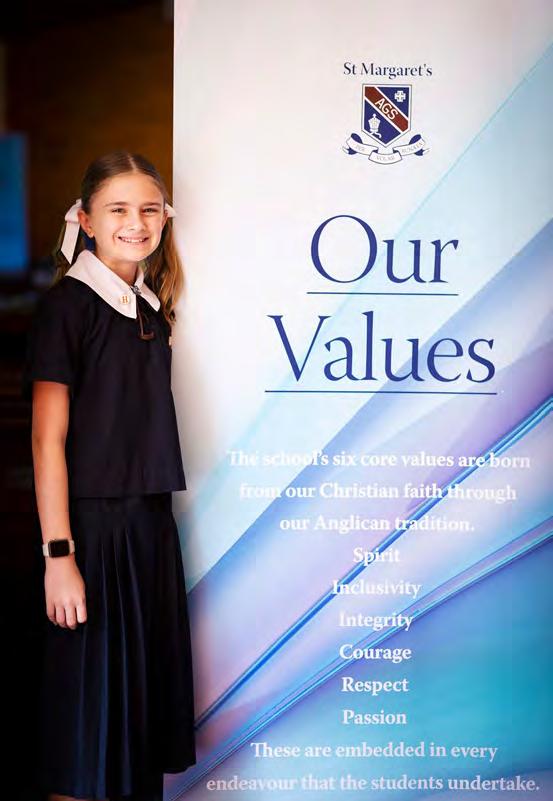
Main Image - St Margaret’s welcomes students from both within Australia and overseas.
Top right - St Margaret’s has introduced inclusivity to its core values. Bottom right - Boarding students learn Japanese cooking at the annual ‘See my differerence, See my worth’ festival.
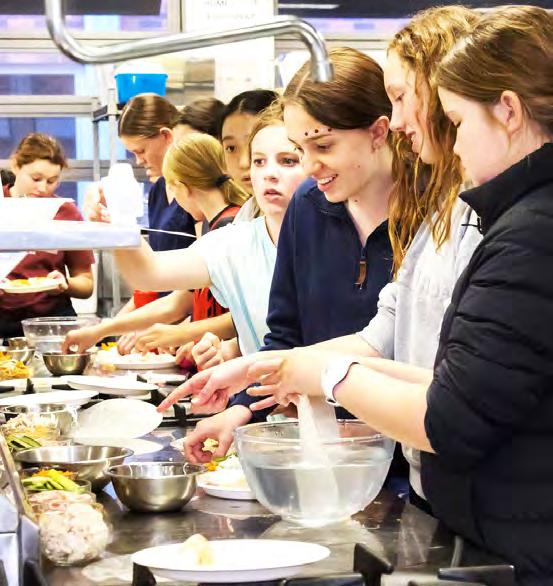
A unique education program for Year 8 students at William Clarke College is leading the way in embracing First Nations culture. The Darug Culture and Language Program celebrates the rich heritage and contribution of all Aboriginal and Torres Strait Islander people so that they may be known, valued and celebrated in the College’s community and beyond.
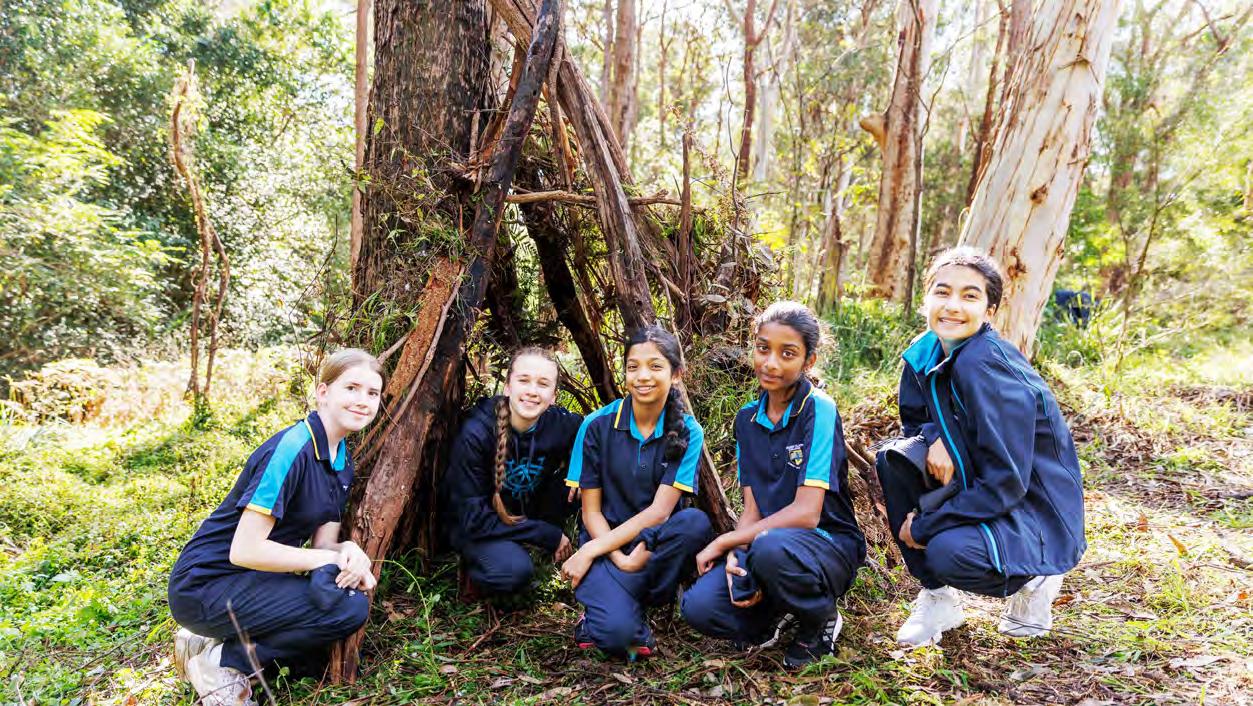
This exciting initiative, now in its second year, has been developed in partnership with members of the Darug community. It offers students the opportunity to engage in learning that progresses their knowledge of the culture, history and language of the Darug people, develops their respect for Aboriginal and Torres Strait Islander peoples, cultures and histories more widely, and encourages them to grow in their skills of empathy as they hear stories and accounts of life for the Darug community post contact.
The College campus is situated on the traditional lands of the Bidji people of the Darug nation. This territory includes the Hills District stretching from Camden to Wisemans Ferry and incorporates the Cumberland Plain in Western Sydney. Teaching and learning have taken place on this land for centuries as Darug elders have passed down their stories, traditions, and knowledge of the land.
Like all Aboriginal and Torres Strait Islander peoples, the Darug Nation suffered significantly post contact. As Sydney was quickly colonised, much of the Darug language was lost and many cultural practices were forcibly ceased. Many Darug men and women, however, are currently working hard to reclaim the language and

educate the wider community about the history of their people and the deep connection they had and continue to have with this land. This is a testament to the resilience of the Darug people.
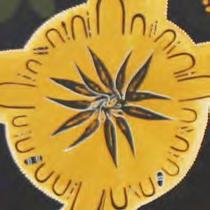
The program is conducted over four intensive weeks throughout the year. Not only does it fulfil the 100 hours of mandated language study required for Years 7 to 10 but it also sits under the College’s Reconciliation Strategy. The Reconciliation Strategy seeks to engage meaningfully and respectfully with members of the local Aboriginal and/or Torres Strait Islander community, and make contributions to the national journey towards reconciliation. The College liaises regularly with the Darug community in relation to program design, content and delivery. William Clarke College is also a member of the local Aboriginal Education Consultative Group who provides feedback and guidance related to the program.
Throughout the program, students and staff are encouraged to engage in learning in a different way than in their other regular lessons. Students are in learning groups with a College teacher, however this teacher acts as a facilitator, learning alongside the students. During
the four weeks of the program, students are encouraged to learn outside (on Country) as a group and abandon traditional classroom set-up.
There are a variety of fascinating units studied within the program including:

This unit introduces students to the concept of Country and the importance of Country to Darug people. Throughout the unit students learn vocabulary and phrases associated with introductions and talking about your location. Students work towards the recording of an acknowledgement of Country in Darug at the completion of the unit.
The second unit encourages students to consider how they can contribute positively to the caring of Darug Country. Students learn about how Aboriginal and Torres Strait Islander peoples care for Country and the systems that have been in place for thousands of years to ensure sustainability. Students learn vocabulary and phrases associated with flora, fauna and weather.
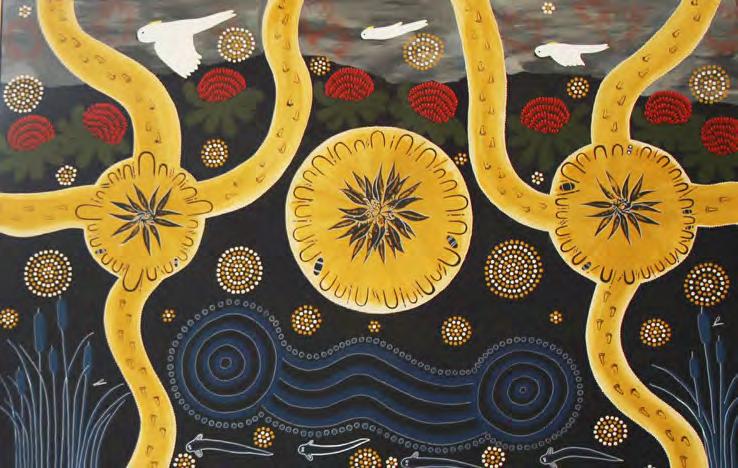
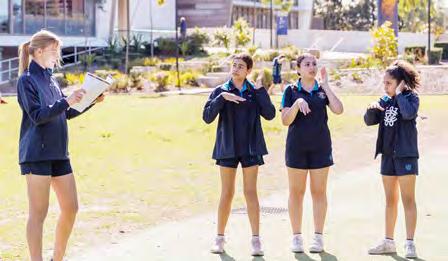
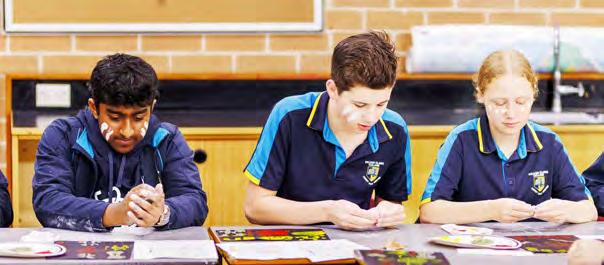
The third unit focuses on relationships and introduces students to the kinship system. Students consider the importance of relationship and the roles they play in preserving culture. Students learn vocabulary and phrases associated with family members.
The final unit of work introduces students to vocabulary and phrases to talk about themselves, their bodies and
feelings. The focus on the individual is purposeful as the students then consider how their learning across the whole program will influence their behaviours in the future. Students work towards the creation of a learning resource that shows their language knowledge throughout the whole program that could then be used as a learning resource within the community.
In addition to the units, the students participate in various incursions that have enabled Darug community members and Aboriginal and Torres Strait Islanders to contribute as much as possible to the teaching of the program. Students have engaged in cultural talks, traditional canoe making, weaving, firemaking, stone axe creation, spear throwing and Aboriginal art.
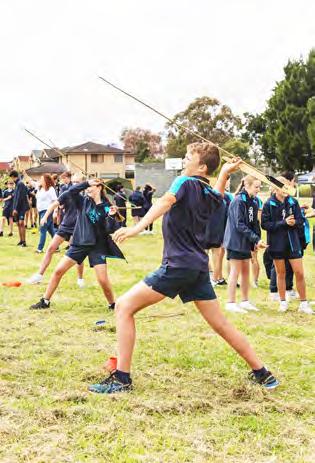
Students also reflect daily in a Reconciliation Journal, in which they comment on ways in which their thinking has been challenged. At the conclusion of the program, students then reflect on their learning throughout the entirety of the program and compose their own personal reconciliation strategy, detailing ways they intend to take their learning further.
The College’s Reconciliation Strategy, which encompasses the Darug Culture and Language Program, recognises that we are embarking on an important journey as a community. Importantly, our strategy seeks to further awaken a passion amid our community for authentic reconciliation where deep relationships are fostered and transformative changes are made. It’s hoped that the Year 8 students of William Clarke College take their learning and experiences from the program into the future, being agents of change and continuing to appreciate the rich culture and language of the Darug people.
ASA CEO The Reverend Peter Laurence OAM was presented the Lanfranc Award by the 105th Archbishop of Canterbury, The Most Reverend and Right Honourable Justin Welby in Perth, WA on Wednesday 5 October. The award was bestowed in the 2021 Lambeth Awards, with the formal presentation delayed due to travel restrictions. Read more about this prestigious award at https://bit.ly/3V2fGDA
St Peter’s Woodlands, SA
During the month of October St Peter’s Woodlands raised awareness about dyslexia with staff, students and the school community. The school got on board the Code Read Dyslexia Network campaign which aims to provide acknowledgement, support and empowerment for people with dyslexia.
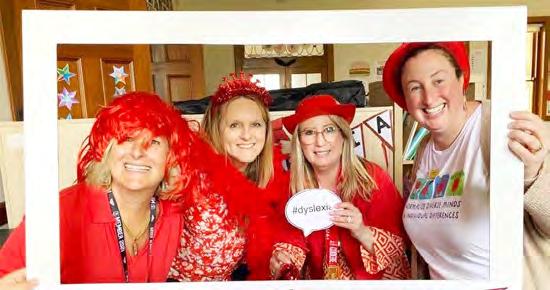
Senior students from St Columba had an audience with the Archbishop of Canterbury, The Most Reverend and Right Honourable Justin Welby.
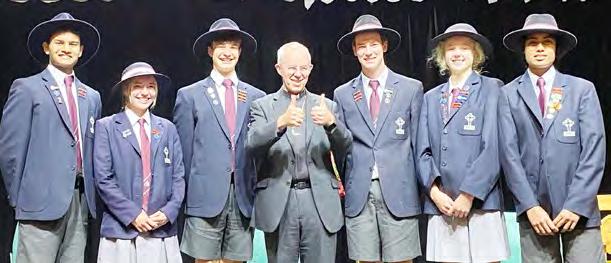
The student leaders, Meet Panchal, Chloe Schmidt, Ben Maclean, Cameron Grigg, Isla Smith and Sean Govender, travelled to Ballina NSW to represent the School at a public lecture entitled ‘Building Peace in Robust Diversity’ led by the Archbishop.
The Archbishop was on a tour of Australia, and it was the first time since 1950 that an Archbishop of Canterbury has visited the Grafton Anglican Diocese.
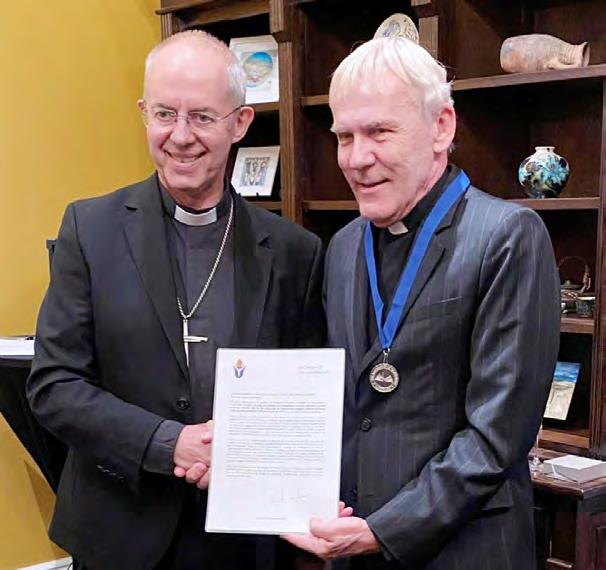
During the month students have had the opportunity to be involved in our annual paper plane challenge, be creative and take a selfie in our photo booth, and dress up for ‘Wear It Red for Dyslexia’. Staff were treated to a red-themed morning tea in recognition of all the amazing work they do in supporting our students with dyslexia.

This year we are shining a light on one of our students with dyslexia, Eva, and her journey.
At St Peter’s Woodlands, student progress is carefully monitored to understand their educational journey and providing proactive support when needed. Students are set up for success with access to high quality and evidence-based teaching in the classroom. Students who require more tailored strategies or supports are supported through our Inclusive Education team, including our Instructional Coach for Literacy, Jo Hirst, who works with classroom teachers to understand how to best support each student. The collaboration between school staff, students and their families is critical to helping each student maximise their potential. You can find out more about dyslexia at the following link. https://youtu.be/oMsv9EgLlts
St Columba Anglican School, NSWMy name is Eva Pfitzner and I’m ten years old. I love making things with my hands like sculpting clay, drawing and cooking. What I also really enjoy is anything active like playing netball and long distance running. I love how I can move my body and it happens so easily. I feel free.

This often isn’t how I feel about learning in the classroom. It can be hard. I have to be really focused all the time and this takes a lot of energy. This is because I’m dyslexic. For me, dyslexia has made reading, spelling, and some maths challenging. It takes me longer to read something and understand it. Sometimes I misread simple words and sometimes pronouncing long words is hard. I can picture a story I want to write in my head, I can see everything about it, but getting the words onto paper takes me a long time.
Working hard in the classroom has taught me perseverance, to never give up and that you just have to keep trying new ways to do something. Your brain is a muscle just like your hamstrings and calves. Some might have to be worked harder than others.
I’ve recently been selected to represent South Australia as one of six under 10 Cross Country athletes to compete in the national competition this year. I just won a silver medal for the state cross country titles as well. I started running when I was first diagnosed with dyslexia. Pushing past the pain knowing that I could reach a target is something I have taken from my running and can apply to my learning in the classroom.

Both my athletic achievements and dyslexia are powered by the same values - which is to try hard things and to never give up.
‘Dyslexia is a specific learning disorder that is neurological in origin, meaning that it is brainbased. It is characterised by difficulties with accurate and fluent word reading and by poor spelling and decoding abilities that do not progress as expected with the provision of wellintentioned and targeted intervention.’ (dsf –SPELD Foundation)
Click below to see the video of Eva’s Story
We’re on our way to being carbonneutral by 2030.
Last year NGS Super announced the move to a carbon-neutral portfolio by 2030. This was in response to clear climate warnings that we could no longer ignore. Environmental impacts and the disruption to economic systems required action. Which is why we’ve made the decision to focus on sustainability and protect our members’ retirement savings.
In May this year, we divested approximately $191 million AUD from companies involved in oil and gas exploration and production. This was a significant step towards our 2030 target for a carbon-neutral portfolio. There is no denying that to solve climate change, we need to rapidly transition to energy sources that don’t emit carbon and methane into the atmosphere. We have taken the view that companies whose revenues rely on further oil and gas exploration and production are at risk of becoming stranded assets as the world decarbonises.

What does this mean for our members’ super? Acting in the best financial interests of our members is always our top priority, and our carbon-neutral plan aligns with that. We expect to generate higher returns by allocating capital elsewhere, including carbon-positive and lowemission investments. We will support companies building sustainable, lower-carbon business, while aiming to improve on current average longterm investment returns for NGS members.
Visit ngssuper.com.au/ESG and watch our Chief Investment Officer to find out more about our reasons for divesting and our progress towards our 2030 carbon-neutral target.
If you’d like to talk to someone about your super, book a time to talk to one of our Super Specialists online or over the phone. Making time to have the chat now could make a big difference to your tomorrow. Don’t forget the NGS Super Helpline is available Monday to Friday, 8am–8pm (AEST/AEDT) on 1300 133 177.

NGS Super is committed to taking action to address climate change and create a better future for our members. That’s why we recently divested from some of the big fossil fuel companies. We’re on our way towards our goal of a carbon-neutral portfolio by 2030.


Find out more about our decision to divest and our plans for the future.



 By The Reverend Andrew Stewart | Mentone Grammar, VIC
By The Reverend Andrew Stewart | Mentone Grammar, VIC
The 2022 Anglican Schools Australia Conference was once again held virtually but this year delegates had the benefit of being able to gather together in hubs to share in the online experience.
The conference was held only a few months after the release of the first round of data from the 2021 census. This data, when it came to Australia’s religious beliefs, made for pretty sobering reading for the Anglican Church. A fact referenced by Archbishop Kay Goldsworthy in her sermon at the conference service and in her subsequent keynote address.
From the 2016 census to the 2021 census the Anglican Church had the largest numerical decline of any religious denomination - declining from 3.1 million adherent in 2016 to 2.5 million in 2021. According to my spur of the moment back of the envelope calculation that meant that on average 328 people left the Anglican Church every day over the past five years. Adherents of the Anglican Church fell below 10% of the population for the first time since census data had been collected.
On the one hand these statistics are not a surprise, a number of commentators making the point that the official statistics are catching up with the lived reality of the church facing the decline of nominal Anglicanism. On the other hand, it is hard not to look at these statistics and feel a bit depressed when you think about the future of the Anglican Church.
This statistical backdrop highlights what makes attending the ASA Conference such a blessing. While the Anglican Church is facing significant challenges, Anglican Schools offer a beacon of hope for the future. The numbers in the pews may be declining but the numbers in our classrooms are on the rise. While the census revealed that the average Anglican is 56 years old, as a school chaplain, the average age of the students that I work with is 13 years old.
There was much to take away from the various conference presentations but one of the things that I really valued was the opportunity to hear stories from former students who
were making a real difference in the world around issues of compassion and justice. They were quick to name the fact that their journey of service began thanks to experiences they had shared in their time as a student in an Anglican School.
A challenge for those of us involved in Anglican education is to make our students more aware of the richness of the resources offered by our Anglican tradition and heritage. Catholic schools seem to do a much better job at present at ensuring that its former students are much more aware of the church they are staying away from.
The ASA is to be commended for its renewed focus on deepening our sense of Anglican identity and demonstrating its relevance for the current generation of students in Anglican Schools. Not an easy task, but clearly a very worthwhile one. There is the perception amongst some in the wider community that the good things that are happening in our schools are happening in spite of the fact that we are connected to the wider Anglican church. The ASA conference reminds us that the good that is happening in our schools is precisely because we are Anglican schools.
I was part of the Melbourne hub for the conference that took place at Bishopscourt. Our Archbishop, Philip Freier, and Mrs Joy Freier generously opened their home and we gathered to watch the conference as chaplains, heads and clergy. There was a lovely hopeful atmosphere in the room as we reflected on the critical role that we play in the future of Anglican schools and the future of the Anglican church.
The 2022 ASA Conference was a successful event, held virtually for the second year running.
Organised by the Perth Conference Committee, many attendees from around Australia attended in local hubs where social gatherings were able to be held.
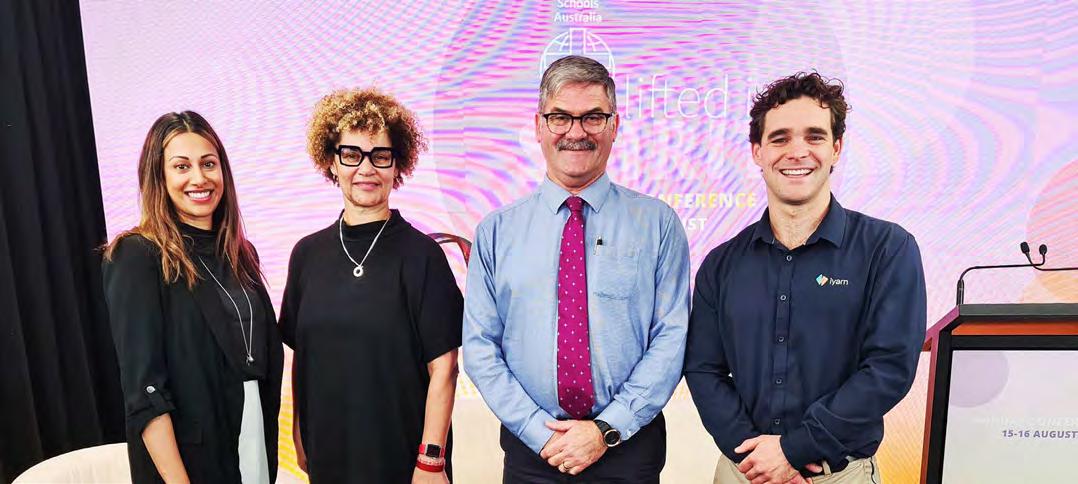
The next ASA Conference will be held in Canberra on 4-5 August 2023 and will mark the first in-person ASA Conference since Hobart hosted in 2019.
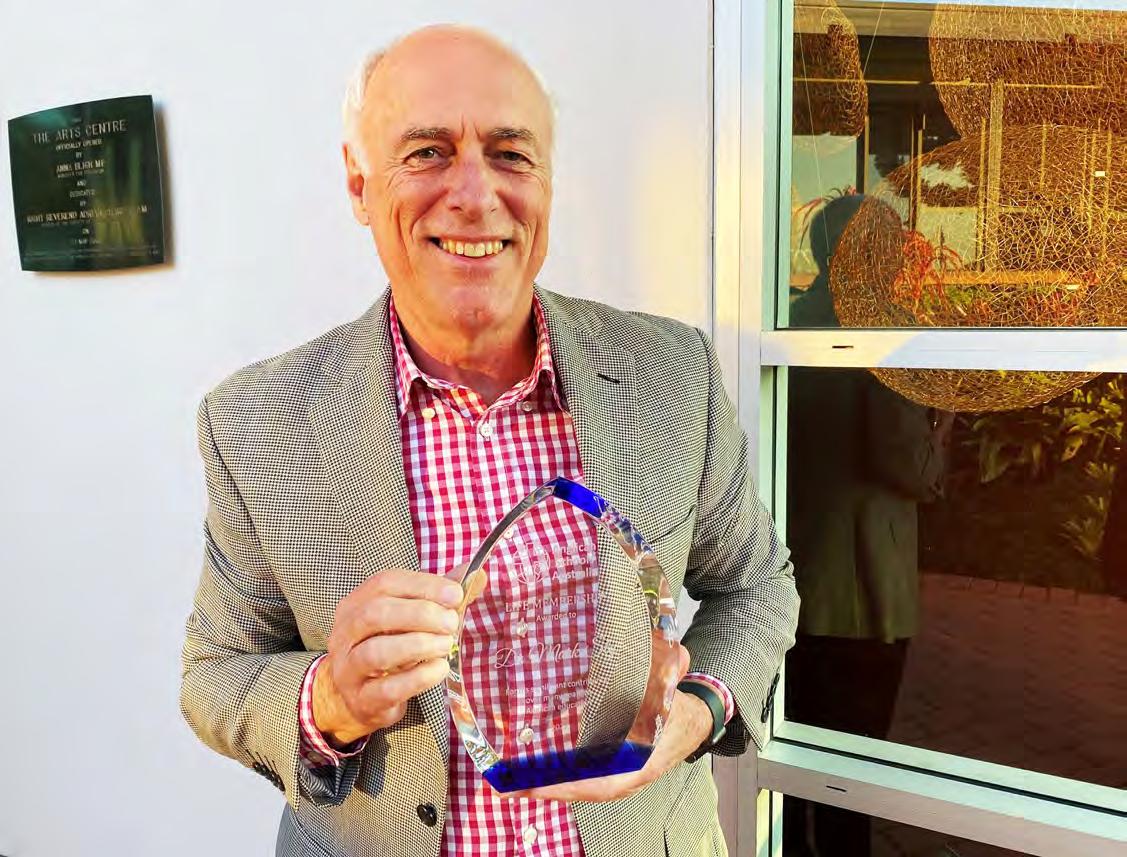
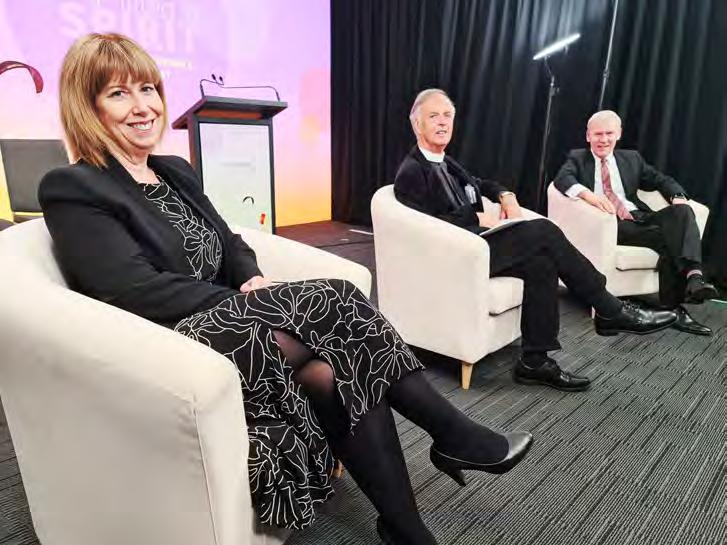
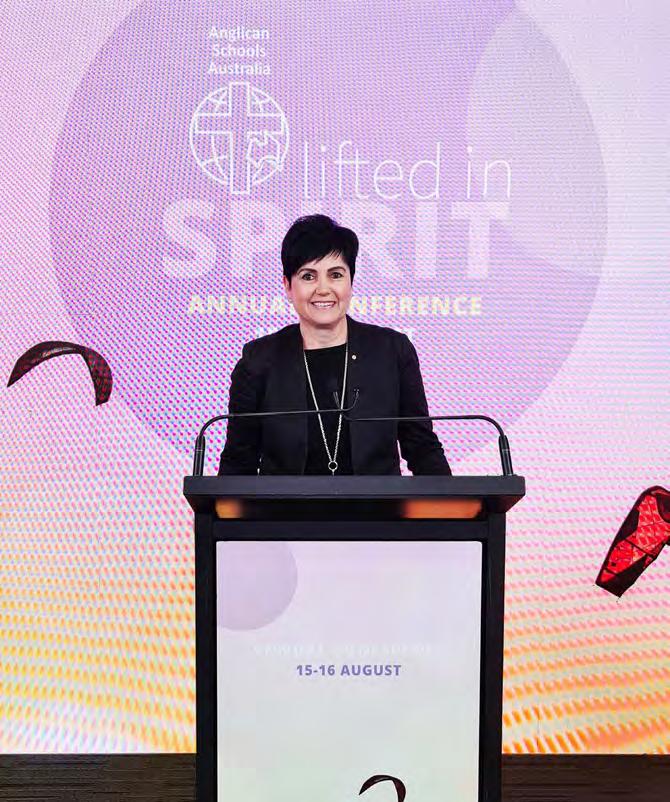


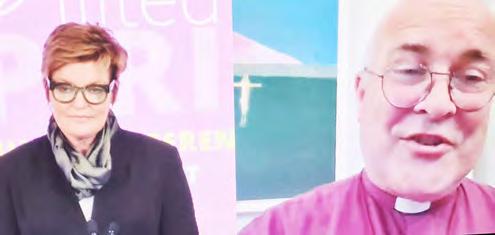
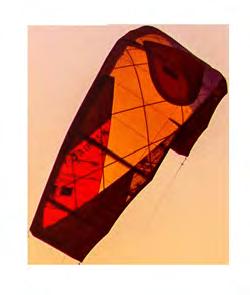

As an Anglican school, Trinity College’s values are founded on Christian teaching and tradition. Our community engagement, positive social impact and uplifting educational opportunities are all key components of our operations, as we actively seek to live our mission of being genuinely open to all.
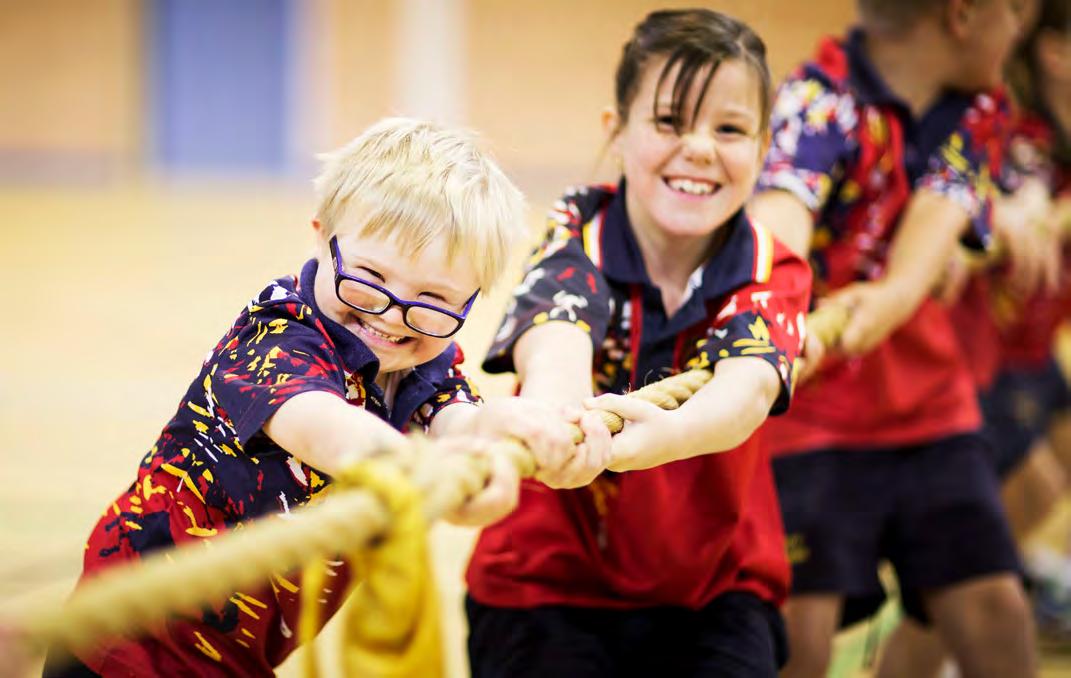
Every school has its own beliefs and values and as a College, we recognise the platform and responsibility we have to deliver inclusivity. We have made a commitment to continuing conversations and learning using our resources to connect members of our community. We display a dedication to diversity and inclusion across all facets of our College and this year, the Trinity College Cultural Safety and Inclusion Enrichment Plan was established. Built via community engagement this plan looks to build dignity and respect for all people. Our goal is for inclusion, diversity, belonging and flourishing to be synonymous with the faith dimension of our College.
The Cultural Safety and Inclusion Enrichment Plan was borne from the College’s determination to build on our commitment to diversity and inclusion and, to constantly seek improvement and growth. The plan looks to build dignity and respect for all people regardless of their gender, ethnicity, faith, sexual orientation or ability. Our Chaplaincy team, board members, staff, students and community leaders have all contributed to lend their expertise to this unifying plan. The plan influences everything from culture to policy and underpins our community engagement.
The plan aims to support inclusivity across our College and in the broader community, including increasing opportunities and acknowledgement for all students, staff, volunteers and supporters regardless of their background.
Cultural safety and inclusion as recognised within the plan include religious tolerance and understanding, gender equity, First Nations, multicultural, LGBTQ+ and people with disability or special needs.
The Trinity College Cultural Safety and Inclusion Enrichment Plan builds on the College’s Reconciliation Action Plan which is being further developed to build a culture of equity, respect and recognition of the cultures, histories and contributions of Aboriginal and Torres Strait Islander peoples as the First Australians and to stand as a beacon to the community around us. Diverse perspectives will be sought to ensure lived experiences inform these action items.

Year 11 student Kaira Wang was recently awarded a Spark Award from Griffith University. The Award allows schools to acknowledge a Year 11 student who is doing the things that matter to create a brighter future in one of four areas. Kaira’s award is for making a difference through diversity and inclusion and respect for all people. Here is her reflection.
The Spark Award recognises my willingness to name an important issue and address it. My leadership has been in the areas of inclusion and diversity, particularly improving LGBTQI+ students’ experience at school, and in the field of social justice by encouraging conversations about mental health.
For me, inclusion looks like everyone having a safe space, knowing that who they are won’t get them bullied or judged in the playground or the classroom. It also means that we learn to hold diverse opinions without letting our ideas hurt other people, or thinking we have the right to tell others how to live their lives, even if this sacrifices some of our personal freedom. All people need to be heard on the issues that affect them, but sometimes it can be hard for young people to feel they have a voice.
A couple of years ago, our school held its very first Pride assembly, inviting a transgender Anglican priest to school to talk about her experience as part of the LGBTQI+ community.

That was a highlight for me because I came from China where I couldn’t even post a pride flag online, but here was a pride flag in assembly! While that made us feel safer about the school’s leadership, we did encounter some backlash from other parts of the school community.
We have come a long way since then. Now, seeing people wearing pride badges at school, tells me the school community has my back. This year students told me our Pride assembly could have been even more Pride! I hope to see it become a tradition, and for our school to always be a place where queer students can be heard and feel empowered.
While LGBTQI+ inclusion is going well, we still need more cultural, racial and disability inclusion. I think we can learn from our Pride experience in giving student voices priority and strive towards becoming more and more inclusive. This will give us a greater range of perspectives.
I think one of the strengths of St Aidan’s is that we have a small enough community that inclusion is much more visible. People aren’t lost in the crowd, so we can see them in all their diversity. We can see how beautiful everyone is.
Inclusivity is something you become aware of as soon as you attend your first day of school. You see that everyone around you is becoming fast friends with one another, and you wonder where you fit in or if you do fit in. I felt exactly like this during my first days of school, and I can imagine my peers felt the same. Luckily, I was invited to play by everyone, and we all enjoyed doing the sorts of activities you would expect little kids to like (playing in the sand pit, riding on scooters and the list goes on…).
At John Wollaston, I have always felt included. Though I am mixed race and a girl, I have never felt like an outsider or someone who didn’t belong. My friends and teachers have always seen me for who I am on the interior, not the exterior. It is saddening that at some schools, students are made to be excluded by their peers or even by staff. That is why inclusion is such an important trait in a school community and one I think that John Wollaston can be celebrated for.
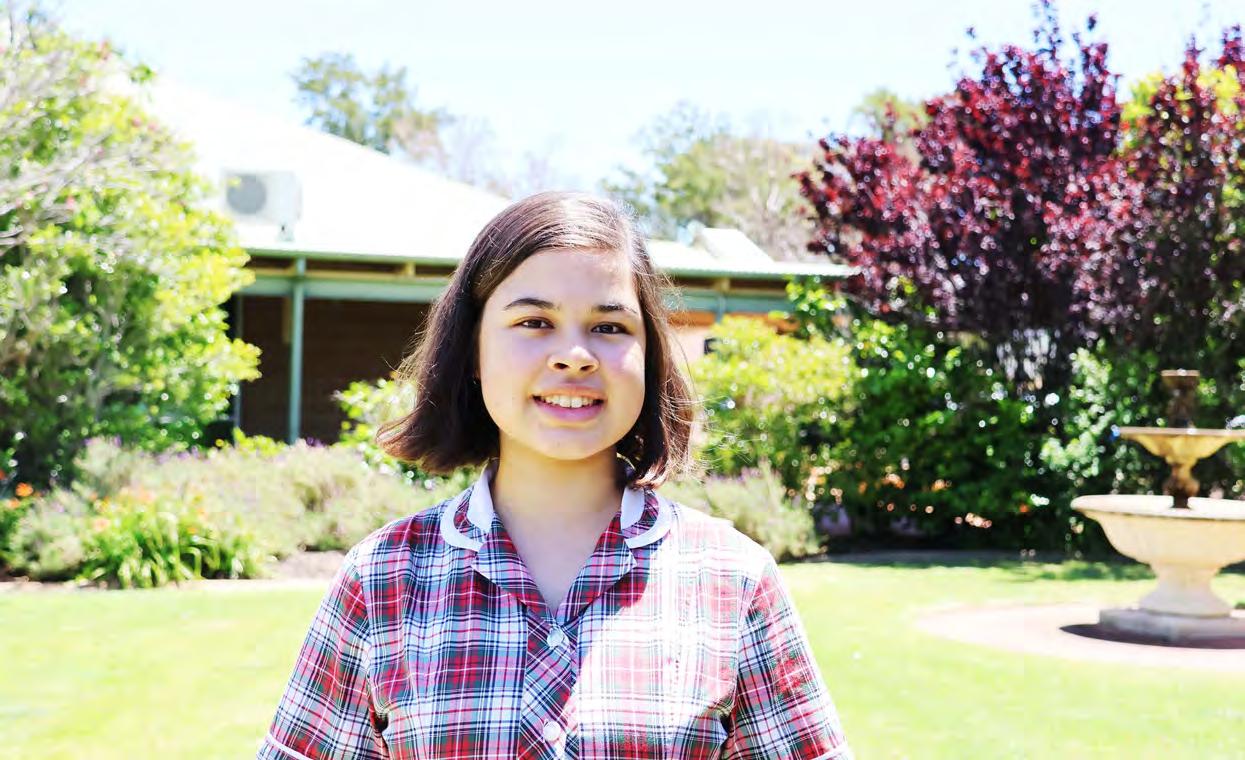
There are so many examples of inclusion at John Wollaston that have taken place just this year. For example, through our chaplain, a group for LGBTQI+ identifying students was formed to help provide a forum for discussion around issues specific to them and to talk about their experiences. We also celebrated International Women’s Day and NAIDOC Week.
Personally, I believe the greatest example of inclusion at John Wollaston is our diverse school body. There are students of all ethnicities, religions, genders, and ability at John Wollaston. Being able to see all these different people from unique walks of life creates an environment of acceptance and therefore, inclusion.
Inclusion is fundamental to creating a sense of community and belonging. It is the difference between spending recess alone and finding people who might become your closest friends. By being inclusive, you are showing someone that they are valued and that you respect them regardless. When you are welcome at school, it gives you comfort in yourself and a foundation for your future.
Melbourne Girls Grammar, VIC
Learning about Christmas is more than just studying the Christian religion for Melbourne Girls Grammar’s youngest Grammarians; it is also about caring for others and the act of giving.
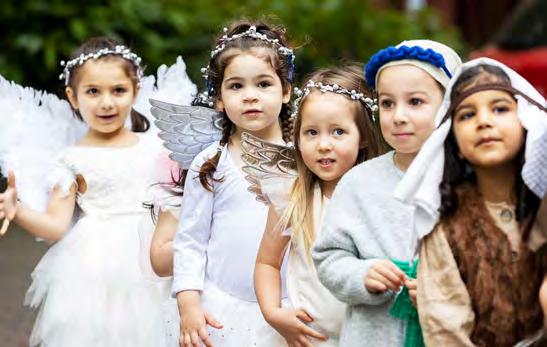
Head of Early Learning Marg Sellar says the School’s ELC students acknowledge Christmas by retelling the story of Christmas through song and narration at their annual Chapel of Celebration.
“Reverend Kirsty Ross visits the ELC before our services and tells the children the story of Christmas and its significance to the Christian faith,” she said.
“They decorate the tree in the Chapel for the celebration and express their ideas through various mediums and craft activities.
“Drawings are used to make programs for the parents and Christmas cards for the residents of Villa Maria Aged Care home and for MGGS Old Grammarians in our multigenerational project.”
Mrs Sellar said MGGS’s ELC community is very diverse, and the Christian faith is one of the many religions celebrated during the year.
“We acknowledge and celebrate that MGGS is an Anglican school, and therefore this becomes the focus of our end-of-year celebrations,” she said.
“We have a diverse community and are very inclusive of all the faiths represented by our families. We encourage all families to share knowledge about the special days related to their faith by presenting to the children if they wish.”
“This develops the children’s awareness of the wider world and assists them in adopting a more global view.”
Reverend Kirsty Ross said Religion is a way people make meaning of the world.
“Our ELC students explore how others understand the world and reflect on how these beliefs and practices differ from those observed by their family,” she said.
“Our ELC Grammarians learn about Christianity by celebrating key Christian festivals such as Easter and Christmas. These celebrations provoke our students to explore the awe and wonder of the Christian faith and provide them with a safe space to explore the deeper meaning behind the stories.”
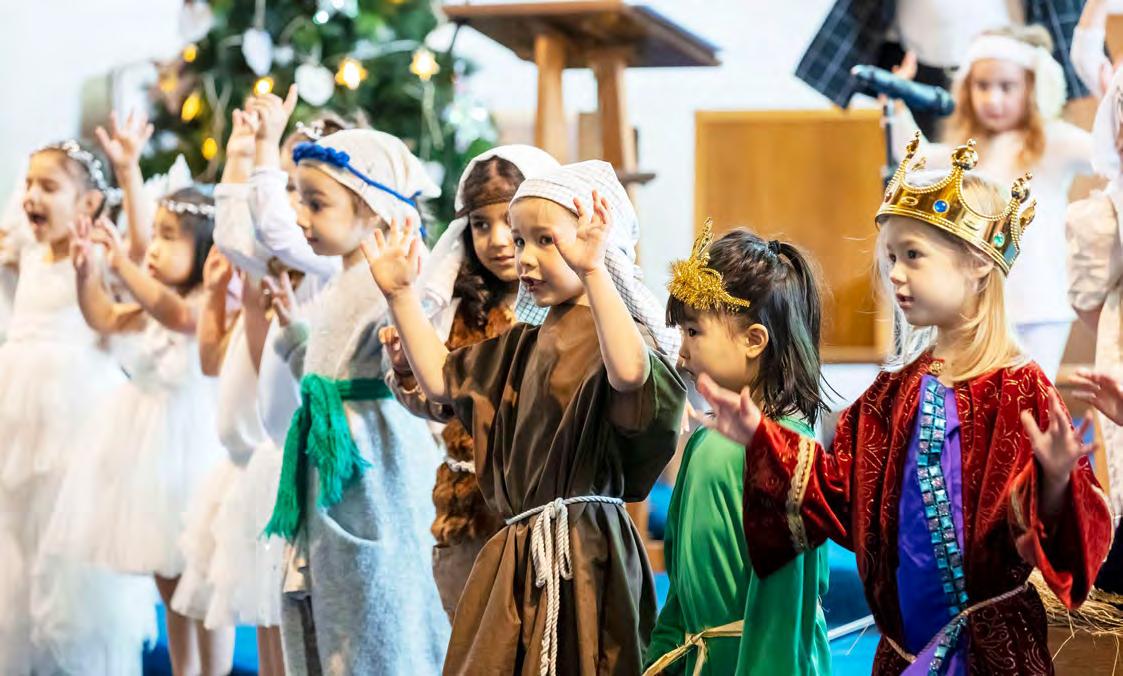
Perth College, WA
When COVID-19 threatened to derail group rehearsal and performance, Perth College Head of the Arts Maree Grayden came up with a plan to combine story, an outdoor setting and performance monologues.
Storytelling aligned perfectly with the School’s 120-year theme of story. Solo rehearsal and an outdoor setting made the exercise COVID-safer. Ironically by the time of the performance, lockdowns, crowd restrictions and masks were mostly memories.
Collaborating with others for truth telling, stories about the past, social change and reconciliation and combining performance, dance and visual art created a ‘multilayered’, spiritual experience for those who took part.

“We wanted to have links to the country on which we were performing,” Ms Grayden said.
The result was Karnarn - Speak Truly, a roving performance through Perth College and a collaboration between First Nations performing artist Trevor Ryan, choreographer Rubeun Yorkshire, writer and director Susie Conte, composer Clint Bracknell, visual artist Kerise Delcoure, the EP!C Youth Theatre Co and Perth College students.
The performance opened with an Acknowledgement of Country and Year 7 Karnarn Dance Collective led by Mia (Year 7) to Emu Dance sung by Mia’s pop and supported by Peter Cumins. The Fanny Bulbuk Story, narrated by Aunty Roma Winmar, told of a strong woman leading change, which led on to Perth College students telling their own truth or the story of someone close to them.
These included stories about finding a voice and then using it to help others find theirs; stories of surviving adversity, finding a path from dark to day, and stories of brave young women taking a leap into the unknown; 14 mini-performances bound together by themes of values, understanding and inclusion.
Susie Conte told the story of Perth College founders Sister Rosalie, Sister Vera and Sister Susannah.
“In telling the story of the Sisters, Susie Conte captured the sense of community, sisterhood, courage and bravery,” Ms Grayden said.
“There was a lot of risk taking, risks by the students. The pieces were not edited by staff. Each story had its own truth. At the start of the performance, we used puppets, including the willy wagtails, to invite the audience into the Chapel to ask them, ‘What sets you free?’”
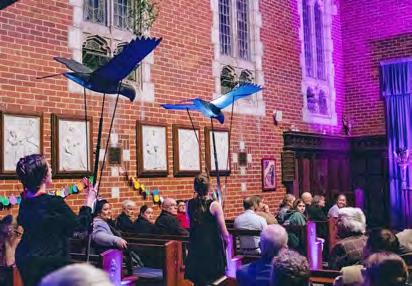
Perth College Chaplin Reverend Linda Pilton said the performance made connections through time and space and to place and people.
“It was a truly spiritual and inspiring experience,” Reverend Linda said.
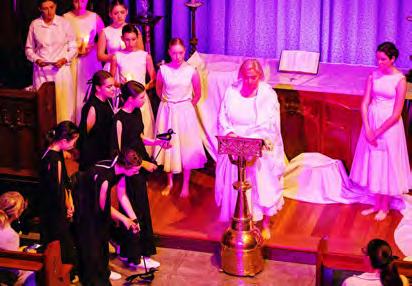
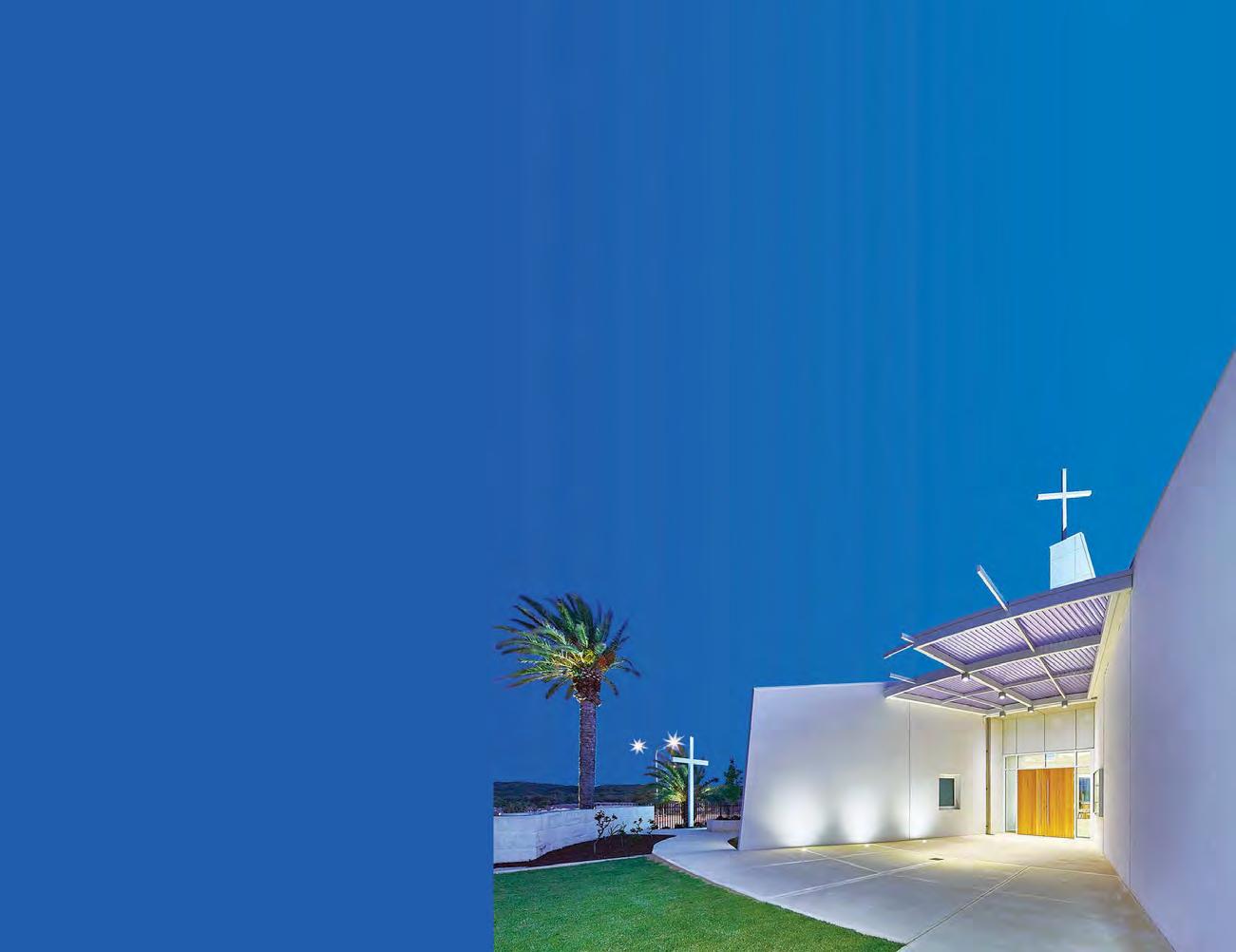
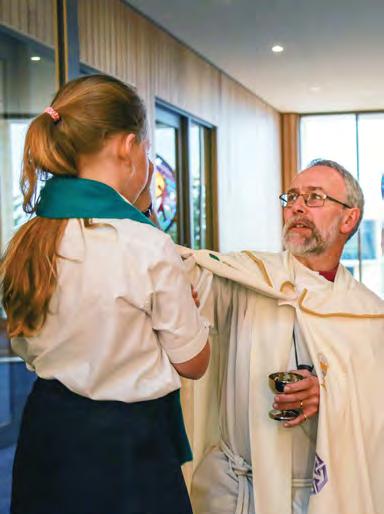
Over many years we have assisted the Anglican Schools Commission to grow to a system of 15 schools educating more than 15,000 students, providing a low fee paying, high qualit y, inclusive and caring Christian education.
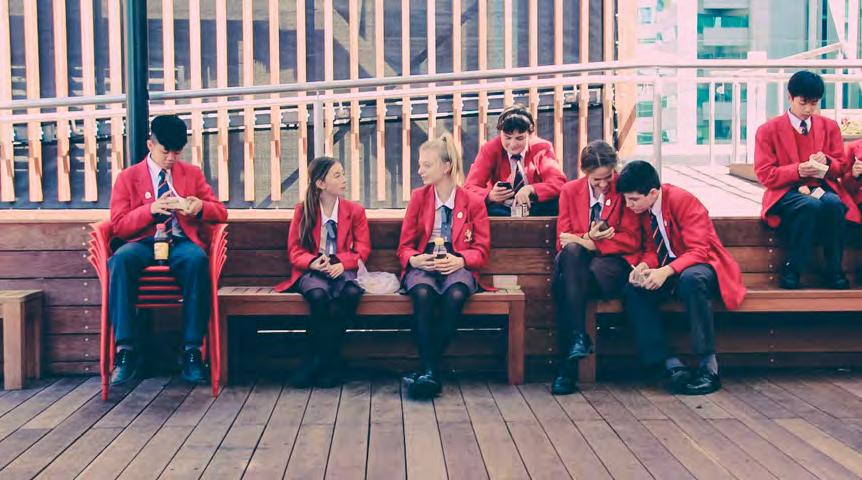
We also assist several other Anglican Schools in the Perth and regional areas in Western Australia If
SA - Anglican Funds South Australia (AFSA)

Blaine Fitzgerald, Head of Anglican Funds South Australia
T. 08 8305 9371 | E. enquiries@anglicanfundssa.com.au
ACT - Anglican Investment and Development Fund (AIDF)
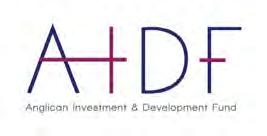
Adam Wright, Relationship Manager
T. 02 6247 3744 | E. aidf@aidf.com.au
QLD - Anglican Financial Services (ANFIN)
T. 07 3835 2355 | E. askus@anfin.com.au
Click here to see the Better Together video
At Mentone Grammar, we have a strong focus on inclusion which comes out of our School Values of Caring, Respect and Service, and it is about ensuring every individual feels valued and heard. Inclusion is about embracing and celebrating our differences, but it also means different things to different people. Fundamentally, inclusion is not just a word – it’s an action, and one that we are all responsible for taking.
As a school, we are committed to doing more in this area and looking at what it means to be a truly inclusive community. To support this, we have implemented a variety of initiatives and programs that allow our students to reconnect with each other while exploring the ways in which they feel included in their community, what inclusion means and how they can incorporate the idea of inclusion into their own lives. As Xianghan L (International Captain 2022) so aptly put: “Inclusive isn’t just accepting, it’s about respecting and understanding.”
While we operate out of the Anglican tradition, we welcome students of all faith backgrounds. Our latest enrolment data shows how truly diverse our student population is, with 24 different religious traditions represented. Since its founding almost a centenary ago, Mentone Grammar has sought to be a place of welcome and inclusion to all who learn and play within its boundaries.
We have developed an Inclusion Committee that meets regularly, with an open agenda, to allow student and staff voices to be heard on this important topic. We also give students and staff the opportunity to share their own moving and inspiring stories of inclusion with the wider community.

In 2022 we also took an important step forward in our own journey to be more inclusive and recognise the important healing effect of reconciliation to our nation. We were incredibly proud to participate in the AGSV Reconciliation Round and developed a very special sports uniform for our Firsts teams that features a design created by Elders from the Lilla Watarrka community in Central Australia with whom we have shared a very special bond for many years.
This is supported by our Reconciliation Action Plan which was developed in consultation with Mentone Grammar Aboriginal and Torres Strait Islander families, School community members, and the School Board to ensure we achieve our goals of educating, inspiring and enabling all members of our community to celebrate Australia’s unique Indigenous heritage, contribute to reconciliation, and break down stereotypes and discrimination.
Our School continues to be greatly enriched by the contribution that each member of our community makes. The message of universal inclusion and the School’s 2022 theme of ‘Better Together’ was well captured in a heartfelt video montage that reminded us all that we are most definitely better together.
 Mentone Grammar, VIC
Mentone Grammar, VIC
A newly established bushtucker garden and yarning circle at St Hilda’s School aims to raise awareness and embed Indigenous culture and learning through the School’s curriculum.
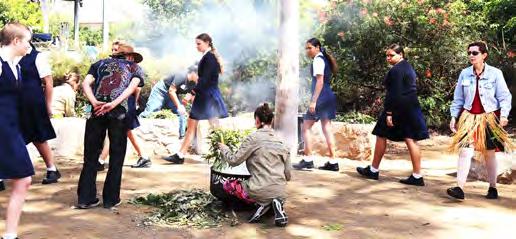
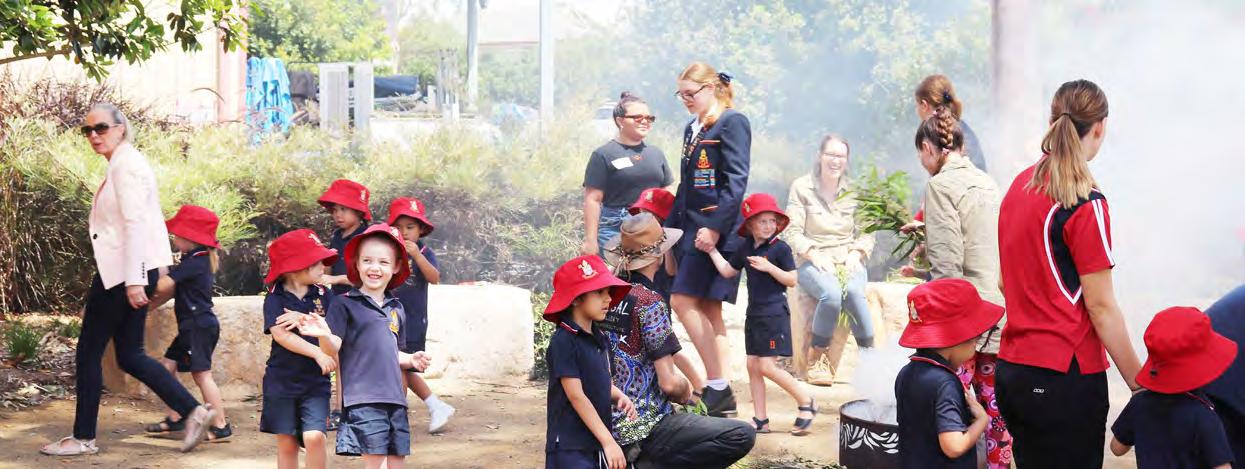
The bushtucker garden will be utilised by both students and the hospitality faculty, while the yarning circle, a place of conversation and contentment, will mirror the nearby labyrinth established last year.
Two years of careful planning and hard work led to the creation of the new area, thanks to the School’s Reconciliation Action Plan (RAP) Committee, Garden Team, Director of Operations Paul Salter, and Justine Dillan.
St Hilda’s School Gardening and Maintenance Team was selected to design, build, and maintain the Bushtucker Garden and Yarning Circle. The team worked with Justine, the Kombumerri Rangers, children from Pre-Prep and Junior School, and from the Senior School students to select local flora that would thrive in its new environment. Both sites are intended to support the School’s Indigenous students as well as providing a way to reach out and establish contacts with the local Indigenous community, the Kombumerri People of the Ngarahngwal and Yugambeh language groups of the Mibiny nation, who not only advised about the design of the garden and yarning circle but also conducted a Smoking Ceremony at the dedication.
“St Hilda’s School has always had a strong relationship with its local Indigenous community, and this project has only served to strengthen those bonds. In years to come, we hope to continue to grow our relationship with Kombumerri Traditional Owners through initiatives such as our Bushtucker Garden and Yarning Circle,” St Hilda’s School Director of Pre-Prep and Head of the Reconciliation Action Plan Committee, Lisa Cleverly said.
“We currently have several Aboriginal students enrolled on Yalari Scholarships from all over Australia. Our Yarning
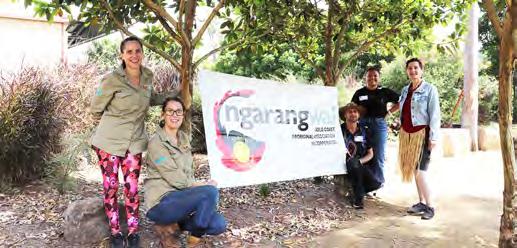
Circle will provide an opportunity for open dialogue, and we believe this will create a more positive learning environment for everyone involved.”
Junior school students are now working on an App that will include QR codes near each plant in the garden. By scanning the code, students can learn the name of the plant and read about its uses.
As part of the opening and dedication of the new areas, a smoking ceremony was held. This ceremony represents a coming together of two cultures with two powerful symbols of life and renewal in the context of Australia: fire and water. The smoke as explained by a Kombumerri elder is a symbol of cleansing and renewal while the sprinkling of holy water by the School Chaplain was a physical representation of prayer and blessing.
Year 11 students and teachers accompany Pre-Prep students through the traditional smoking ceremony Students participate in the smoking ceremony, a tradition that sees the smoke cleanse the area and ward off bad spirits from the people and the land. St Hilda’s School Reconciliation Action Plan Committee (RAP) all played a strong part in the planning and preparation of the spaces.Almost 100 students, six teachers, and two dogs from St Margaret’s Anglican Girls School cut their hair, raising more than $90,000 for research and services for people living with cancer.
The students and their furry friends added to an eightyear tally that has now exceeded half a million dollars in donations to the Cancer Council Queensland and the Minotti Trust (established to support the family of a St Margaret’s staff member who lost her life to cancer).

As for the ponytails, they have been made into countless wigs for patients suffering hair loss.
St Margaret’s school dog, Luna, and the Head of Primary School’s dog Daisy joined the cause for the first time this year, with both cavoodles being clippered and coiffed by local groomer CC’s Pampered Pups, while the students’ ponytails were cut by hairdressers Ink For Hair. Luna raised over $700 towards the overall fundraising total.
The Ponytail Project was first launched in 2015 by four St Margaret’s students after a member of the school community was diagnosed with cancer. The students were so moved to help, they launched the student-led fundraising initiative called the Ponytail Project, believing that cutting off their ponytails for charity was a small price to pay to support those impacted by cancer.
Sadly, in 2016, St Margaret’s students had even more reason to support the cause after the loss of one of their beloved teachers, who was also a past student, to cancer.
The groundswell of support in its first two years fuelled the drive for the Ponytail Project to become an annual campaign for the St Margaret’s community and, in 2019, the movement was encouraged in schools state-wide after being adopted by Cancer Council Queensland.

Principal Ros Curtis said that giving is a part of the culture at St Margaret’s.
“We encourage our students to develop the practice of lifelong giving through philanthropic activities like the Ponytail Project,” she said.
opportunities empower the girls to experience how their actions can make a positive difference in the lives of others and inspires them to continue on a journey of giving into their adult lives.
“The Ponytail Project requires the girls to do much more than fundraise and donate money though. It requires the girls to give something of themselves – to donate their own hair.
“I am immensely proud of their willingness to do this in today’s age of technology and social media, where much emphasis can be placed on a young woman’s appearance.”
Cancer Council Queensland General Manager, Fundraising, Marketing and Communication, Meaghan Bush, congratulated the students on another amazing effort.
“We are so grateful to St Margaret’s for their unparalleled support of the Ponytail Project since bringing it to life in 2015,” Ms Bush said.
“Every ponytail chopped makes an incredible impact, with funds raised going towards lifesaving cancer research and essential support services such as counselling, accommodation, and transport services for people living with cancer.”
St Margaret’s Anglican Girls St Margaret’s School Captains Ruby Greenup and Holly Marchant cut off their ponytails to raise funds for cancer.“These
St Michael’s Grammar School, VIC
Mr Gerard Houlihan has been appointed as Head of St Michael’s Grammar School. Commencing at the School in 2001, Mr Houlihan has occupied numerous leadership positions across the School. Most recently he has been the Dean of Teaching and Learning and Head of the Senior School, as well as Acting Head.
In 2020 Mr Houlihan was awarded a Victorian Fellowship from the Australian Council of Education Leaders. He has authored numerous articles on education and presented at conferences nationally and internationally.
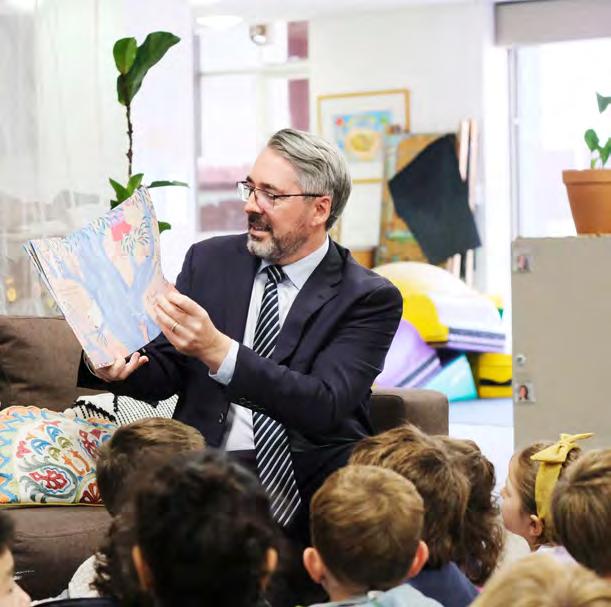
Throughout his time at St Michael’s, Mr Houlihan has been responsible for significant innovations, including the SchoL-AR online learning program, the design and implementation of the School’s Wellbeing Triage and Restorative Practices Framework, and the Student Profile Dashboard and Navigator program, which supported students and families during COVID-19 lockdowns.
Mr Houlihan started in the role in Term 4 2022.
This year, Bunbury Cathedral Grammar School celebrates fifty years of education in regional Australia; the first co-educational, independent, Anglican, day and boarding school offering education to Primary and Secondary students.
As the events of this year mark a milestone in our School’s history, it was also fitting to acknowledge the founders who had the vision, the volunteers and staff who implemented that vision, and the families who make up our School community.

Local author, Richard Offen, was commissioned to compile a history of the School: The School in the Bush – A History of Bunbury Cathedral Grammar School 19722002. Replete with images of staff and students from the last 50 years, the book captures significant events and people and provides insight into the moments that have shaped our School.
At a Black-Tie Dinner, hosted by the School Foundation, the inaugural Headmaster, Mr Eric Speed, reminisced on what the School grounds were like when he arrived (fairly bare and sandy) and the numerous tasks he undertook such as hiring staff, helping to select the school uniform, and starting the Parents and Friends’ Association.
The night was also special with five of the six Heads of School in attendance, along with several foundation students and staff. It was wonderful to see them reconnect and there were many tables filled with past students, staff and current parents enjoying a fun evening.
Across the fifty years, there have been wonderful successes and achievements to celebrate, pivotal moments upon which to reflect and many stories to share. With more than 3,500 graduates, and the generosity of our wider School community, we were able to build and renovate the physical structure, becoming a key part of the local community.
“The School has grown and developed but still retains very much the essence of what was originally imagined; a focus on excellence, providing exciting opportunities for students that mean they can stay in the region and not need to move to Perth for their education, and a focus on Anglican values,” said Deputy Head of School, Mrs Kathy Chiera.
The support of the Anglican Diocese of Bunbury was one of the key factors in the establishment of the School. The founding of the School was a direct result of the vision of Bishop Ralph Hawkins, Bishop of Bunbury at the time. In 1972, most independent schools, many with boarding facilities, were located in Perth, which was a long journey from the South West.
Bishop Hawkins was tireless in his work to launch the School, and was Chairman of the first provisional Council, and then the School Council, holding this position for five years, until his retirement in 1977.
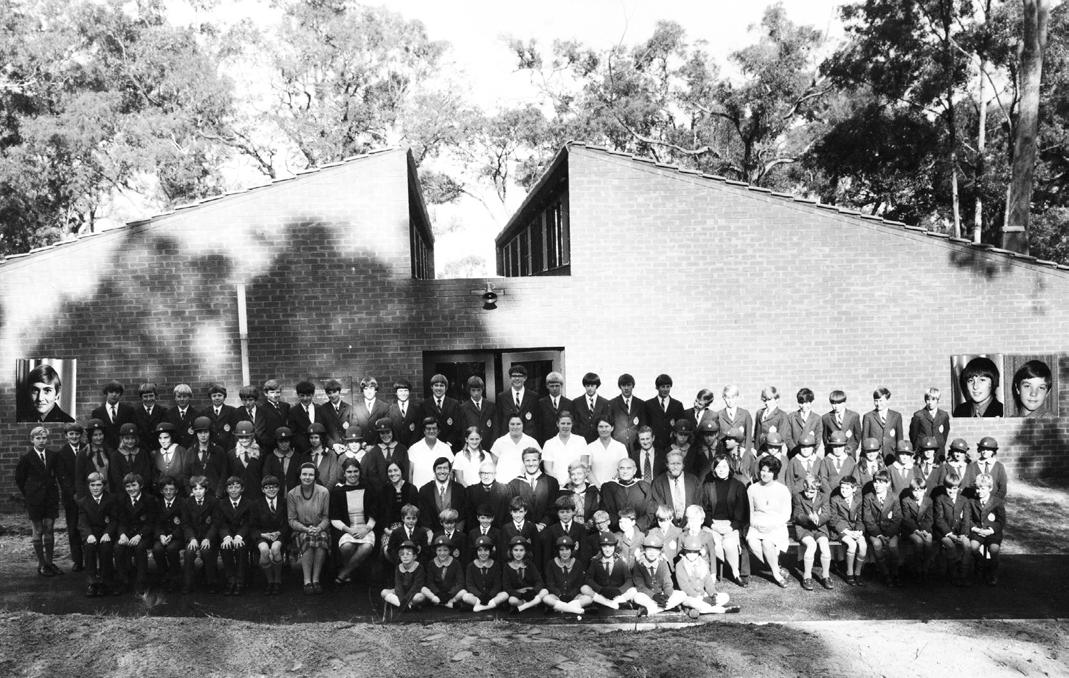 Bunbury Cathedral Grammar School, WA
Bunbury Cathedral Grammar School, WA
The foundation headmaster Eric Speed noted the Bishop’s significant contribution to the School and the wider Bunbury community in his end of year report in the School’s annual publication, The Bonifacian
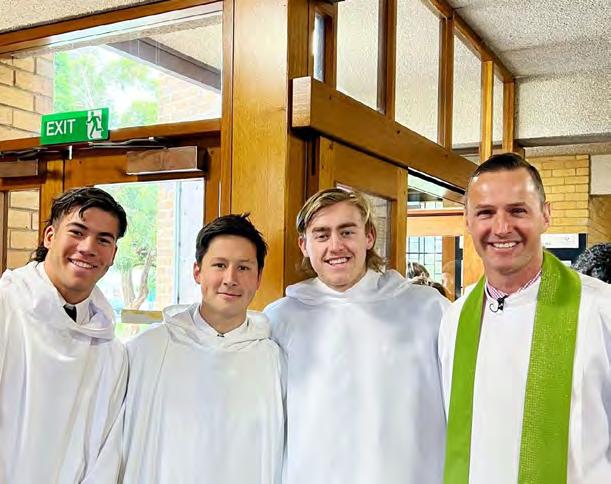
“Bunbury Cathedral Grammar School was established largely as a result of the efforts of Bishop Hawkins, who, at no small inconvenience to himself, went out into the community to seek the support of the people in the South West, who to their credit responded magnificently to the requests made of them,” Mr Speed said.
“Fide et Opere was indeed a well-chosen motto for a new school and the Bishop certainly gave meaning to it by way of demonstration.”
It had always been Bishop Hawkins’ intention that the new school would ensure that future generations could receive a sound education grounded in Christian faith and ethics, a proud tradition which continues to this day, ensuring students of the South West can learn and grow in an outstanding environment, close to home.
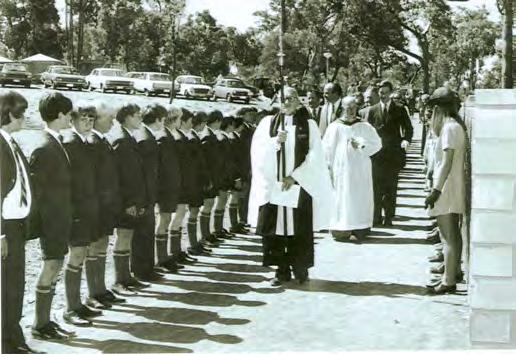
Faithful to the vision of Bishop Hawkins, our School has flourished to become a benchmark for education in the South West, attracting families and students from across Australia and the world.
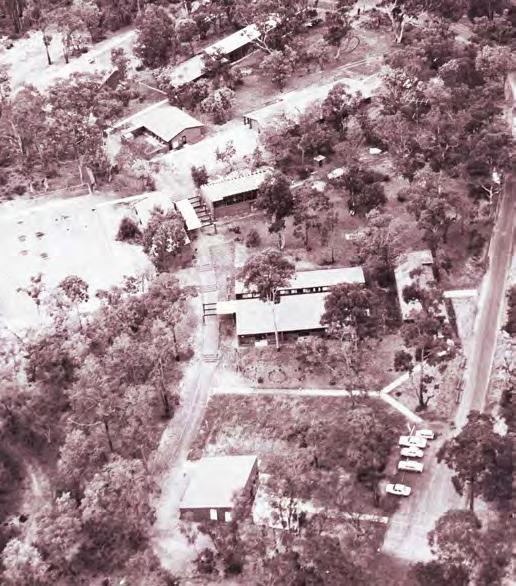
Brighton Grammar School has appointed The Reverend Peter Waterhouse as Secondary School Chaplain, commencing in the role in October 2022.
Reverend Waterhouse said he was looking forward to immersing himself in the spiritual life of Brighton Grammar.
“If there is one word that would aptly summarise my approach to school ministry, it is the word incarnational,” he said.
“I am passionate about sport, musical performance and outdoor education, and so I always seek ways to be involved in the wider curricular life of the school and incorporate the lessons learned through those pursuits into my pastoral conversations, classroom teaching and chapel talks.
“I am also committed to strengthening the relationship between Anglican schools and the Diocese, as well as educating staff members in the Christian worldview, assisting them where possible with thinking through how to incorporate it into their own discipline or field of knowledge.”
Reverend Waterhouse taught sport, health, and biblical studies at the local Anglican school before moving to Melbourne in 2007 with his wife Joanne to complete theological training. He was ordained in the Melbourne Anglican Diocese and then served as the Curate at St. Mark’s Camberwell before taking up the role of Chaplain at Hume Anglican Grammar in 2014.
His choice of Bible verse for school students is Ecclesiastes 12:1 – ‘Remember your Creator in the days of your youth’ and a favourite adage is: “Jesus doesn’t promise a smooth flight, but he does promise a safe landing.”
Brighton Grammar School,William Clarke College has appointed Mr Alex Koch as incoming Head of College, commencing in January 2023. Mr Koch joins William Clarke from his most recent position as Deputy Headmaster – Secondary School at Arndell Anglican College.
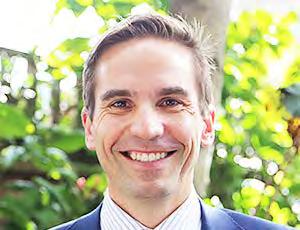
Mr Koch is excited to be joining the William Clarke community and said he was honored to be appointed their fourth Head of College.
“The fact that William Clarke College is a Christ-centred community is very attractive to me. William Clarke has a great history in wrestling with what it means to be a Christ-centred community in today’s world,” he said.
“William Clarke has shown the courage to concentrate on the holistic development of their students, and to prepare each student thoroughly for life beyond school. I share the College’s desire to see students thrive in the classroom and beyond.
“The College has been exceptional at exploring how best to harness new approaches to learning in our increasingly globalised and digitally connected world. This has included giving students the opportunity to explore their passions and interests, which we know enhances motivation and engagement.”

Mr Koch has a Masters of Educational Leadership, a Bachelor of Divinity from Moore College, a Bachelor of Education, a Bachelor of Science (Mathematics) and recently completed the Company Directors Course with the Australian Institute of Company Directors,.
Mr Koch has also served at several schools including St Catherine’s School at Waverley, St Andrew’s Cathedral School and Shore School, and is currently a Director on the Board of CRU.
Primary students at Brisbane’s St Margaret’s Anglican Girls School recently took part in a Prayer Space themed around the school’s core values of spirit, inclusivity, integrity, courage, respect and passion, all of which are born from the school’s Christian faith through the Anglican tradition.
Prayer Spaces are held each term for both the primary and secondary students to explore life’s spirituality and faith in a safe, creative and interactive way.
St Margaret’s Chaplain The Reverend Jazz Dow said the Term 4 Prayer Space presented the perfect opportunity to explore the school’s core values which had recently been revisited with some minor changes and additions.
“Reverend Susan and I thought it was important to allow the students to immerse themselves in the school values through the Prayer Space experience – giving them the chance to reflect on how the values make a real-life difference to their own lives and those around them,” Reverend Jazz said.
William Clarke College, NSWOne of the many aspects of Prayer Space that students enjoy is the interactive nature of each station or activity.
“The invitational nature of prayer space means students have autonomy and are the decision makers during the session. Students can explore the theme in ways to which they best relate and can also reflect on how the theme impacts their daily life,” Reverend Jazz said.
“The themes we choose become tangible and accessible rather than being global or abstract ideas – they become applicable and relevant through the Prayer Space experience.”
Inclusivity is a new core value for St Margaret’s, adopted this year after a collaborative review of the school’s values involving the whole school community. At this station, a mandala decorated in rainbow-coloured rice symbolised each individual’s differences and uniqueness which, when everyone is included, creates beauty in the world. As the students placed rice in the mandala, they were invited to consider their community and how they can ensure each person feels cared for and included.
Before the students explored this Prayer Space, Reverend Jazz and Reverend Susan facilitated a group discussion about inclusivity.
“The students were eager to share their understandings of what this new value meant in the playground and the classroom. Some interpreted it to mean ‘making sure everyone is included in games’ and ‘celebrating everyone’. There was a collective joy
and obvious relatability toward this value,” Reverend Jazz said. Other interactive spaces included the Peace Garden, which was filled with multi-coloured paper flowers adorned with peace messages. Students wrote: ‘I feel at peace when I am meditating on my own’; ‘I feel peace when I’m having a hug’ and I feel at peace when I’m listening to the rain’. This station was linked to the core value respect and connected the notion that peace begins with respect for our world, community, family, friends and ourselves.
The courage station invited students to write a prayer or wish for courage on card and peg their message alongside those of their peers.
Reverend Jazz said students really valued the spaciousness of Prayer Spaces and the opportunity to explore big concepts in real and tangible ways.
“Students, and families, lead very busy and scheduled lives. Prayer Space is a scaffolded space that allows students to explore with purpose and meaning but freely and without required outcomes,” she said.
“The feedback from students always includes the valuing of silence and space, and that after a visit, they feel much calmer. Teachers also report this same feeling of calm and groundedness, and often say it continues into the classroom in the following session.”
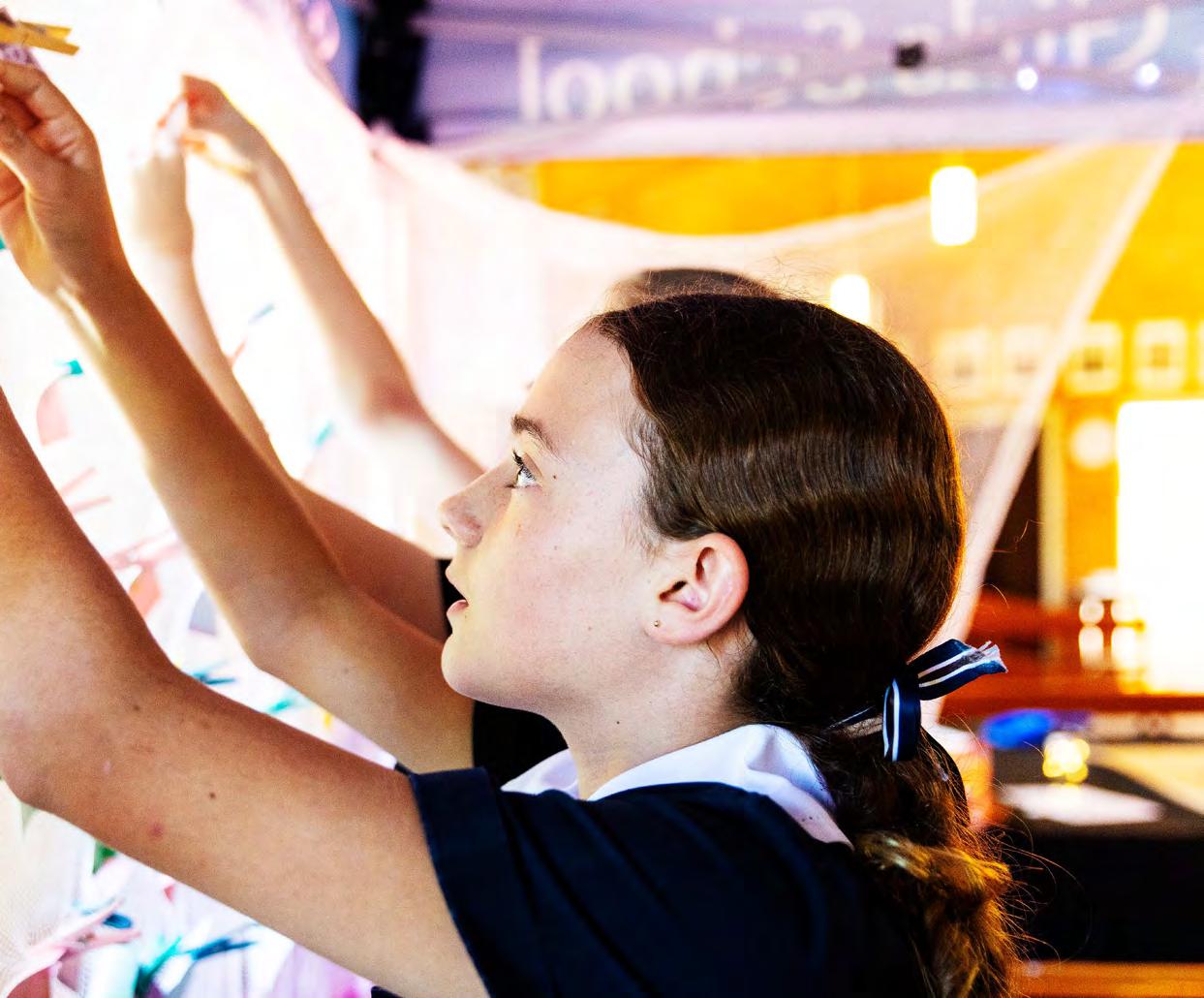
Tintern is a kind and connected community. We are committed to caring for our students and providing engaging programs, enabling them to become responsible global citizens. Wellbeing and learning to respect differences between people is fundamental to our health, overall happiness and success.
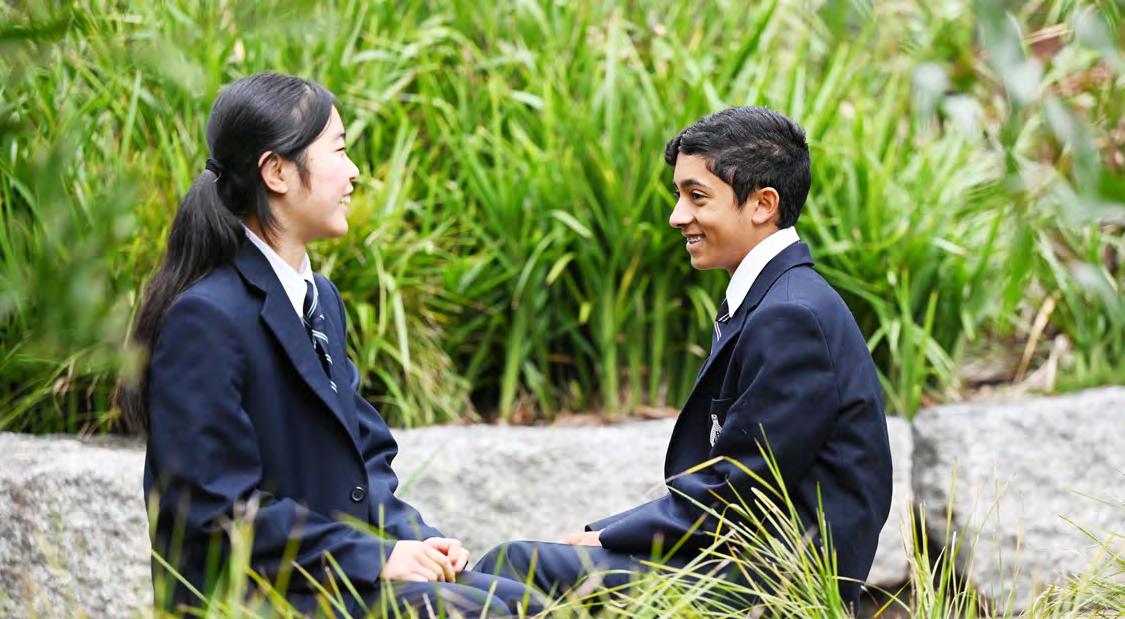
When we improve our understanding of diversity, neurodiversity and inclusion, and learn to embrace the differences between each other, we can help build the self-esteem and resilience of ourselves and the students, setting them on a positive learning path for life.
Neurodiversity Celebration Week is a global initiative challenging stereotypes and misconceptions about neurological differences, aiming to transform how neurodivergent individuals are perceived.
Tintern Grammar celebrated the week earlier in 2022, delivering relevant information through the Pastoral Program, running a themed assembly, placing educational posters around the School and selling student-designed badges to raise funds for Irabina Autism Services.
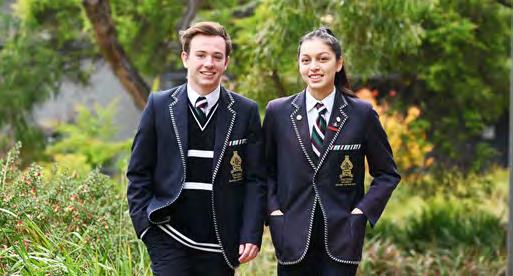
Students were involved in planning for the week, the intention being to continue consultations and provide awareness throughout the year.
Year 9 student Scarlett, who contributed to planning for Neurodiversity Celebration week said: “Celebrations of diversity from Pride month to NAIDOC week to Neurodiversity week have historically been vital in raising awareness and acceptance in all communities across the globe. In school environments, where so many students feel alone or isolated because of their differences, these celebrations are vital.”
By celebrating neurodiversity week at our School, I feel like we have affirmed school-wide support for neurodiverse
people and opened discussions about diversity that continues to make our School a more welcoming and accepting place,” she said.
“I believe that we will continue to become more open minded and better individuals and a stronger community, that is more welcoming of all its parts.
“I think that by being vocal about our support for neurodiverse people, we can encourage others to do the same and lessen the stigma that surrounds neurodiversity and mental illness. From my perspective, Neurodiversity Celebration has influenced the views and opinions of many students and has fostered an open minded and accepting attitude toward diversity in the student body.”
Youthworks Christian Outdoor Education is the industry leader when it comes to integrating the Christian worldview with professional outdoor education.


Our exclusively Christian leaders are each highly trained, qualified, and experienced, not just in outdoor skills, but also in transforming those teachable moments into life-shaping, faith-developing experiences.

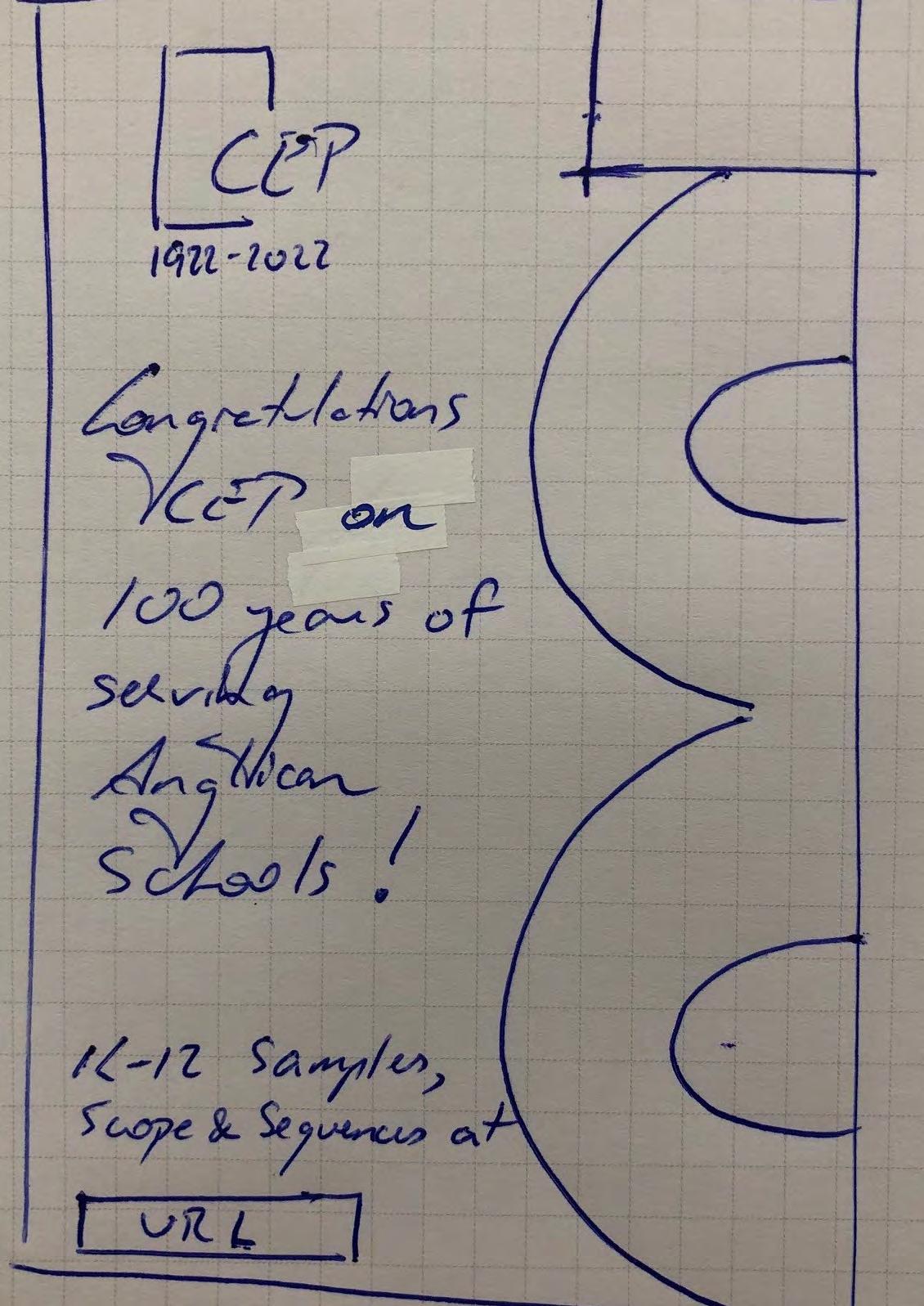
The growth in Christian education and keeping up with the times has been the secret to the longevity of CEP (Christian Education Publications) since it began in 1922.
Celebrating its centenary this year, Head of CEP Natasha Percy said the organisation had evolved since its start as the publishing arm of the Board of Education of the Sydney Anglican Diocese.
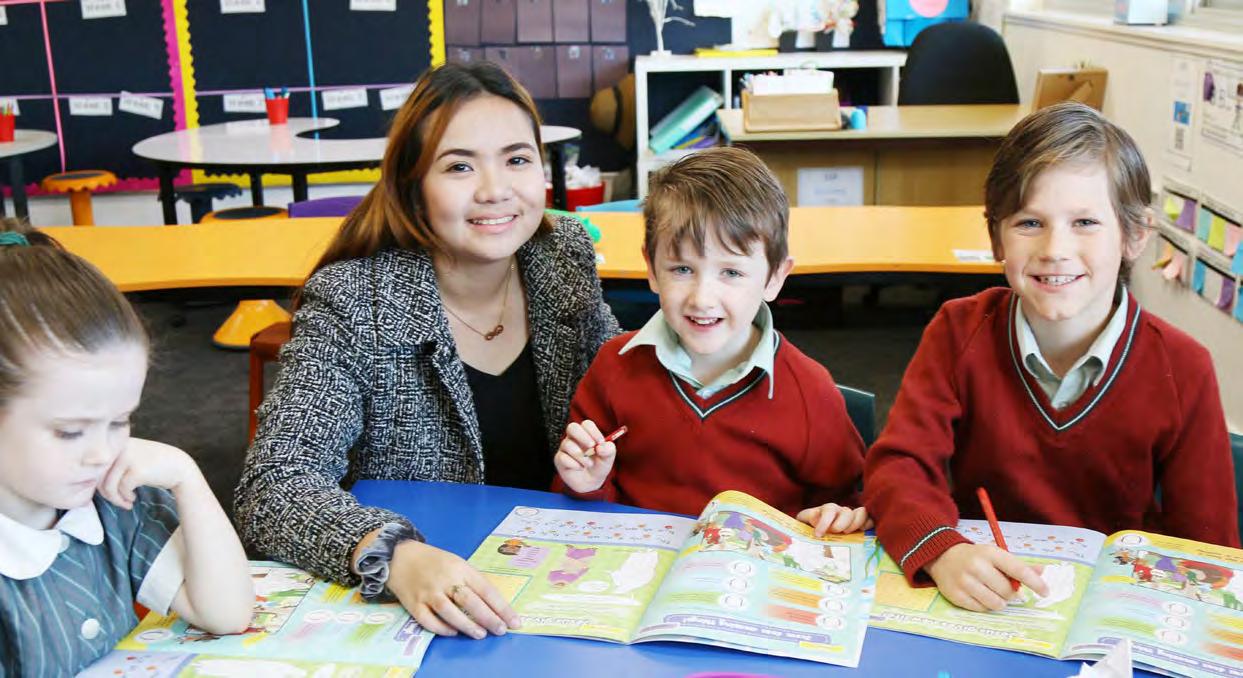
Originally providing material for Sunday School and children’s club with The Trowel, the first Special Religious Education (SRE) material, The Sword, was produced from 1961 for volunteer teachers in State schools who had limited preparation time and resources. This publication was replaced by Connect in 1996 which has sold more than seven million copies.
Ms Percy said CEP had started small and grown over time with the resources used across the Christian denominations.
“Resources for children and youth will always be needed. Our work has been valued over the years and because of that, we’ve been able to grow and provide not just for Church ministry and SRE in State schools, but resources and material for secondary Christian Studies in independent schools,” she said.
The success of the Connect publication in State schools led to the 2005 production of CEP’s first secondary product specifically for independent schools, John Dickson’s A Spectator’s Guide to World Religions, with the curriculum written by Simon Smart. To date, this publication has sold more than 50,000 copies, and CEP now offers 26
distinct secondary resources for independent schools with combined unit sales of nearly 400,000 to date.
While Australia is the main focus for CEP, the organisation has expanded over time, with a customer base in New Zealand, and in schools in a range of countries from Cambodia to Rwanda.
Another change in recent years is the range of digital resources now available to schools along with the traditional hard copy format.
“What that looks like over the years has changed. For example, the type of illustrations has changed, we now have digital activity books, and all courses are available in both formats. The goal has remained the same but how we achieve that has changed and evolved with the times.”
Ms Percy said CEP aimed to continue to support teachers of Christian studies and religious studies.
“We want to provide robust resources that teachers can rely on, students find engaging and that accomplish that holistic learning that students and teachers are looking for,” she said.
“Our goal over that time has been to produce quality resources that are age appropriate, biblically faithful and that are engaging,” Ms Percy said.
Hume Anglican Grammar, VIC
Associate Chaplain, The Reverend Dr Satvasheela Pandhare writes about the wide range of inclusive and cultural activities embraced at Hume Anglican Grammar School.
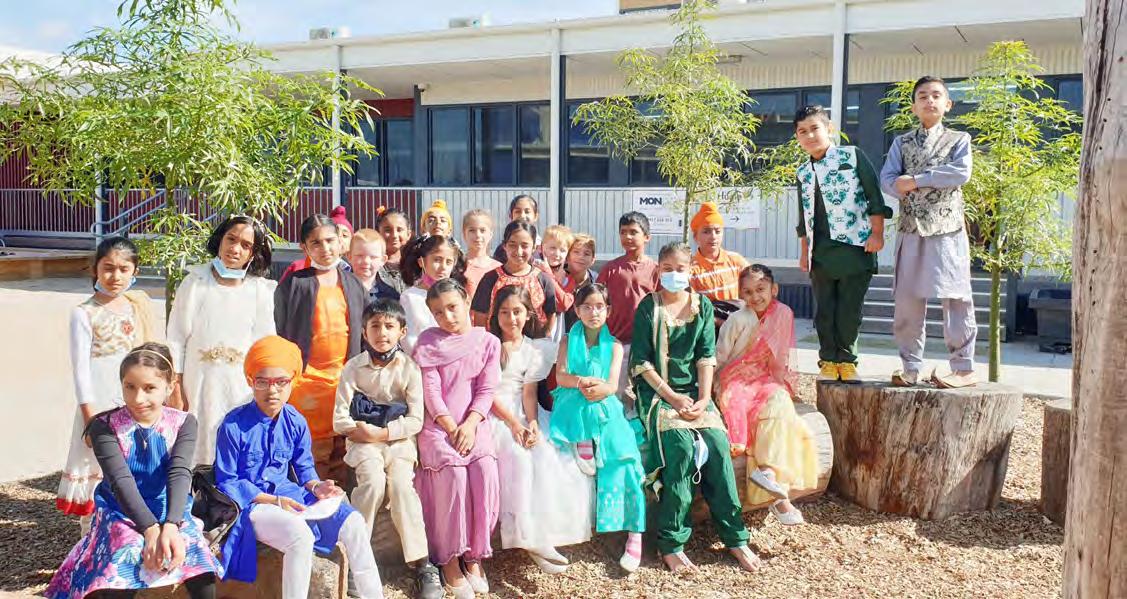
Hume Anglican Grammar has three campuses, which are hugely multicultural. It is beautiful to see students and teachers from different nationalities working together happily extending their love and support to one another.
The school focuses on creating an inclusive spirit within the students through different programmes and activities having every cultural representation included.
We teach different cultural arts to our students to create liking and respect towards various arts. Sometimes, experts are invited to teach these arts.
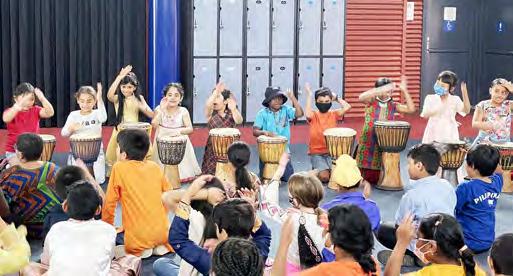
Harmony Week is observed in the school to celebrate Australian multiculturalism, and especially the integration of migrants into the school community. The special feature of the Harmony Week is the Cultural dress day. Students and teachers wear their cultural outfits and participate in the singing and dancing.
Diwali (Festival of the lights) is the most important festival of the Hindus in India. We celebrated Diwali in the library hour with a display and readings featuring books and resources about India, Hinduism, and the story behind the festival.
The students were excited to spot the items on display that are so central to this special event and shared with us the many different ways they celebrated together with family and friends. During Library sessions, students shared with their classes the meanings of the festival, including how it celebrates the victory of light over darkness.
Students from every religious background enthusiastically participate in the chapel services and the school choir.
At Hume Anglican Grammar the students and teachers enjoy being part of the cross-cultural activities that gives them opportunity to express their love for each other.
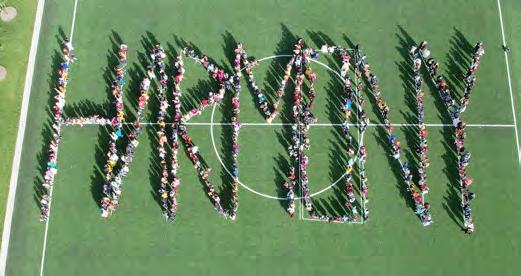 Taking part in African drumming
Harmony day
Taking part in African drumming
Harmony day
Students from Hume Anglican Grammar in Melbourne’s north were recently announced as winners of the 2022 Illuminate: NextGen Challenge for the third year running.
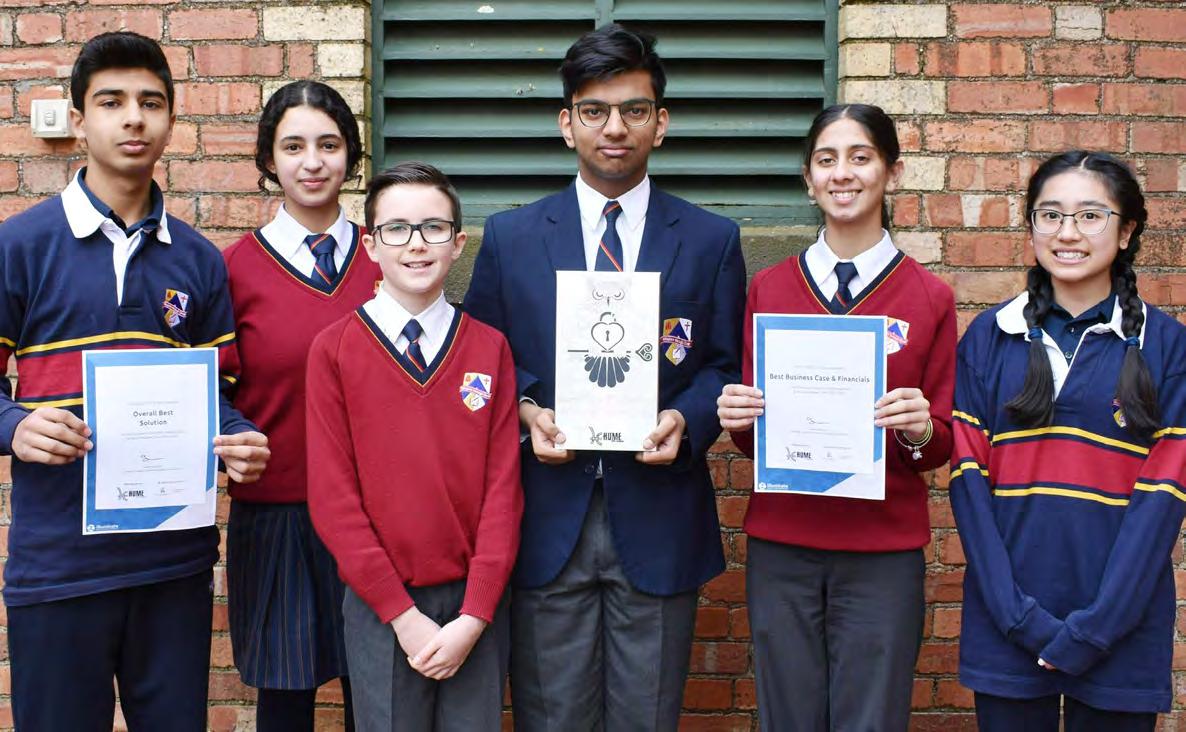
The Challenge is the flagship program of illuminate Education Australia, providing high school students with an authentic entrepreneurial environment for them to activate the confidence, creativity and capability to reach their full potential through solving problems in their community.
As part of this year’s competition, students were required to prepare and present a fully integrated business proposal that would explore reducing waste and engaging community action on waste-related matters.
Business teacher and the School’s Careers Counsellor Rochelle Rosendale said the students’ business choice was in line with the school’s environmental programs which included recycling, community involvement and awareness programs while also aligning with a number of the School’s core values, including excellence, respect and responsibility.
Students from Hume Anglican Grammar enter the annual competition as part of their participation in the school’s SHINE Program – an endeavour which seeks to support gifted and talented students, their teachers and families, to understand them as learners and to strategically develop their gifts into talented outcomes.
The group’s presentation won the ‘Best Business Case and Financials’ along with the ‘Best Overall Solution’ award. They were later approached by the Hume City Council, local industry specialists and private research University Worcester Polytechnic Institute, in Massachusetts, USA, to continue discussions in exploring ways to put their proposal into action.
English teacher Shirley Kutin also worked closely with the students and said the School was very proud of their achievements.
“These young adults are such amazing role models for their peers and now have a very real opportunity to drive positive environmental change that will leave a legacy for generations to come.”
Shirley Kutin, English teacher
The Bishop Druitt College community is known throughout Coffs Harbour for our diversity and inclusivity. Our community is drawn from families with diverse backgrounds, including families from our local Aboriginal and refugee settlement communities. Our Anglican identity is expressed in our outworking of the Five Marks of Mission, with an emphasis on our school motto, Faithfulness in Service, in pursuing justice, reconciliation and caring for the creation.
We have many extra-curricular student groups, with an emphasis on student leadership and voice in each of our groups. Three of these groups, the Human Rights Group, Goori Group and Environment Group, joined together to travel to Brisbane to participate in the Anglican Schools Goodji Festival in August 2022.
Our first stop was an immersive visit to St John’s Anglican Cathedral, Brisbane. For most students, this was their first visit to a Cathedral, and they were quite taken by the physicality of the space, evoking transcendent spirituality.
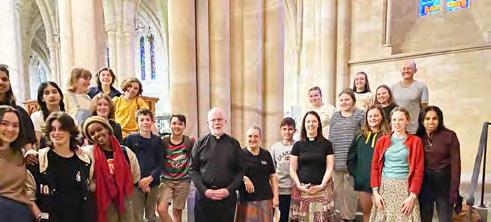
The students were inspired by conversations with The Very Reverend Dr Peter Catt and The Reverend Dr Ann Solari, hearing stories of activism and daily acts of justice on a macro and micro community level.
Service Captain Matilda Watson said: “We headed on a tour of the beautiful building where we learned the history, heard stories, and learned about how the cathedral makes a positive impact on the community and inspires change in the world.”
“St John’s Cathedral aims to raise awareness surrounding climate change, refugees, homelessness, and so much more. We got to be a part of this change when we folded blankets for the cathedral’s programs ‘rough sleepers’, where homeless people in Brisbane can sleep at the cathedral to ensure they have a roof over their heads.”
Our evening meal connected with the not-for-profit
social enterprise, Mu’ooz Eritrean Restaurant, where students heard about their training, work experience, and job opportunities for African refugees. Even the accommodation was an educational experience, sleeping on the conference floor of St Francis Theological College.
The Goodji Festival was held at St John’s Anglican College, Forest Lake, hosting the gathering of students from Anglican schools in QLD and NSW, welcoming them with live music, food and prayer space activities.
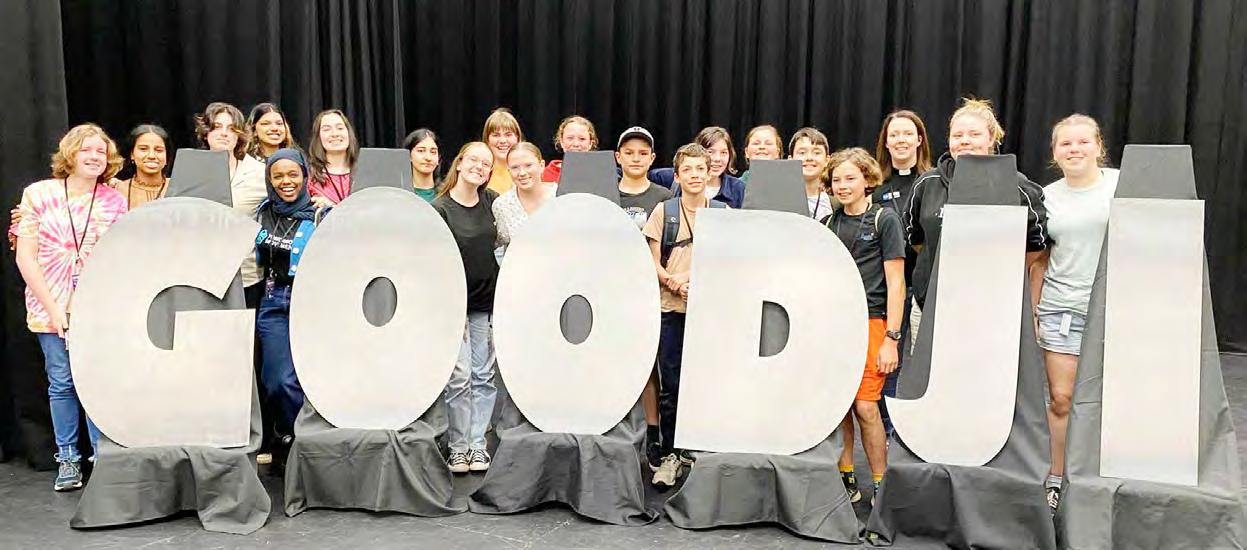
Speakers and workshops across the day connected students with climate change, storytelling, permaculture, social ideologies, community building, sparking questions and interest in the hundreds of people that filled the room.
This student-led conference has changed the BDC students who attended, leading to students stepping anew into their youth leadership, establishing storytelling circles using the ‘Jewel’ framework where students learn to listen well to others’ experiences.
Bishop Druitt College is isolated geographically from other Anglican schools, and connecting to students from Anglican schools across borders created a new sense of Anglican identity.
The Goodji Festival was organised by The Reverend Richard Browning, Director of Mission for the SE Qld Anglican Schools Commission, and we look forward to what the 2023 program holds for us.
Research tells us that when our teenagers feel included and connected to each other, their school and the wider community, it translates to not only positive well-being but also academic success. This sense of belonging and connection equates to students feeling happier. At St Mark’s, we strive to create opportunities for everyone to belong, make lifelong friends, and make a deep connection with their school.
At the beginning of the year, we set our Year 12s a challenge commit to 20 Hours of Service in 2022 or ‘20 in 22’. As part of this, every Year 12 student chose from a range of service activities: working with Anglicare, running lunchtime activities for Middle School students, organising Spirit Week, or connecting with our local community.
The students who chose the local community option decided to give out flowers to the elderly in our community. The aim was to spread joy, (or spreading love and kindness as one student said) and connect with and recognise these community members for their contributions.
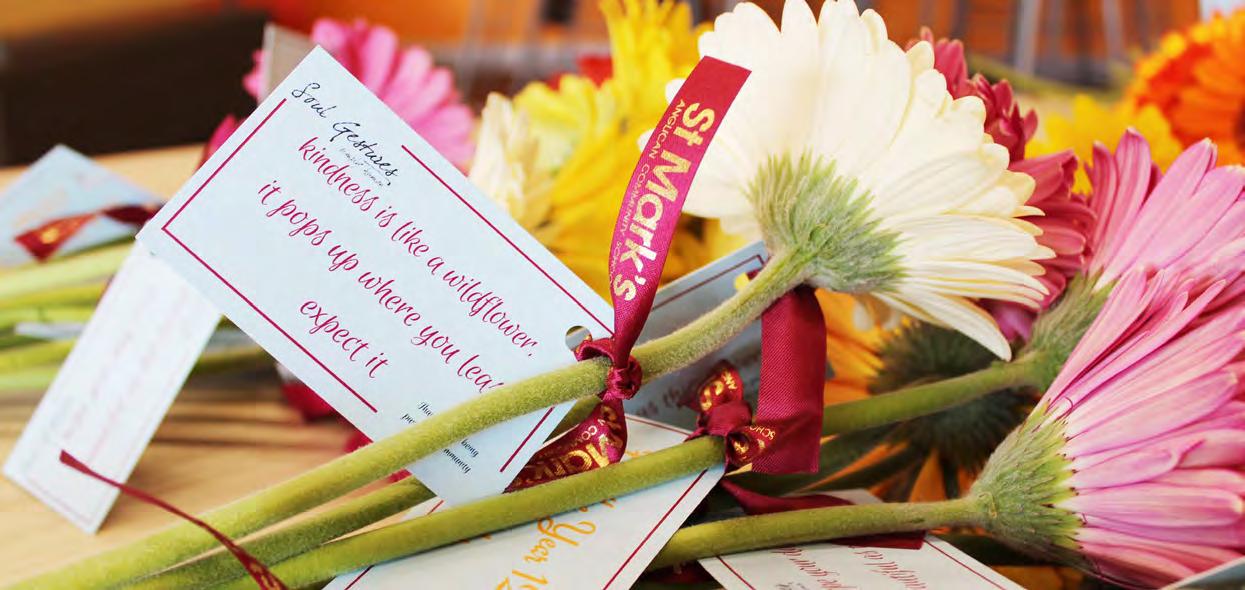
The amazing feedback from the seniors, retail workers and shoppers was overwhelming. As Catherine said, “This project has shown how the simplest of connections can transform lives. It was created by a magnificent bunch of young people who went outside their comfort zone to bring joy, connection and comfort to many seniors in their community.”
There were many stories; people going through hardship, people who just wanted to talk to someone, and people who experienced an incredible sense of joy as they received a flower. The most amazing part of all of this was the transformation in the students. Whilst we watched the smiles, tears, and excitement of those who received a flower, we were also overwhelmed by the joy our students experienced. This one simple gesture taught them how helping and connecting with others brings joy.
In collaboration with local organisation, Soul Gestures, spearheaded by Catherine Kolomyjec, and the Westfield Whitford City Shopping Centre, an energetic group of Year 12 students, made their idea a reality. This included liaising with the shopping centre, sourcing brightly coloured gerberas, designing cards, scheduling distribution rosters and distributing the flowers during lunchtime.
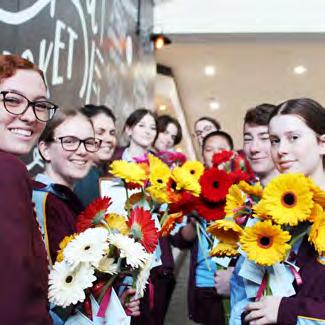
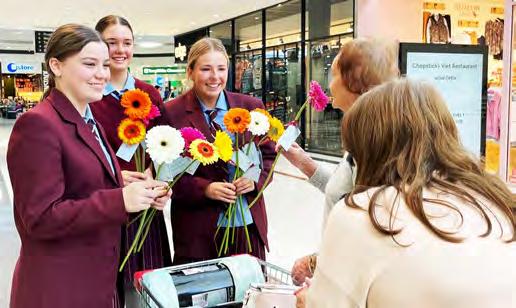 St Mark’s Anglican Community School, WA
St Mark’s Anglican Community School, WA
“I think we should do more – what else can we do so that people in our community feel valued and heard?” - Student
“The lady wanted to share her story, she wanted a hug, and it felt good to share that story and show her that I was there for her.” - Student
Inclusion has been described through UNICEF as “the most effective way to give all children a fair chance to go to school, learn and develop the skills that they need to thrive.” (United Nations Children’s Fund [UNICEF], n.d.).
The introduction of the Alternative Pathway Experiences (APEx) at St George’s Anglican Grammar School offers students a variety of pathways that fit their individual needs. At the start of the 2022 school year, St George’s Anglican Grammar School introduced the Murdoch University’s FlexiTrack High program which allows Year 12 students to pursue tertiary education without the need to travel an ATAR pathway or achieve an ATAR score.
Much research has now been undertaken to show that not all students demonstrate their true potential and aptitude for learning via the traditional end-of-year examinations. Indeed, for neurodiverse students, as identified by C Henning’s research (Henning et. al., 2022), this approach may often not allow them to showcase their skills.
One such St George’s Anglican Grammar School student was our APEx Dux for 2022, Brianna Goss. Brianna found ATAR in Year 11 challenging and made the decision to change pathways as she stepped into the increased demands of Year 12. As a student leader, Brianna knew that she needed to balance the many and varied demands made upon her in Year 12 and subsequently thrived in the flexible learning environment offered by the university preparation course provided by the Murdoch University FlexiTrack High program.
Changing from ATAR to APEx helped Brianna’s career aspirations of studying Science at university, securing an early entry offer from Murdoch University.
Brianna said she enjoyed FlexiTrack High as it removed the emphasis on exams, allowed her to focu on maintaining her positive mental health, build better coping strategies during times of stress and to have a more balanced pathway to holistically meet the challenges of Year 12.
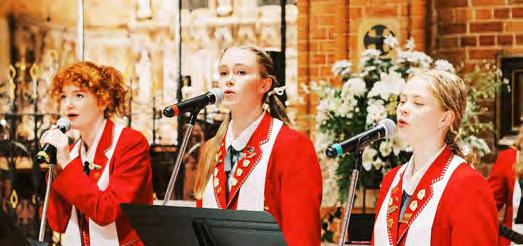

“It has also allowed me to reflect on ATAR and the intense pressure that is often linked to this pathway. It was important for me to know that there are many different routes to where you want to go, and you should not be worried to take an alternative path, if in the end this is a better choice for you,” she said.
“For some of my friends, they are entering ATAR examinations knowing this is the best pathway to university for them. For me FlexiTrack High offered me an alternative and it was one in which I flourished thanks to the ongoing and consistent support of my St George’s teachers alongside our Murdoch University tutors.”
Selecting the alternative pathway still allowed Brianna to participate in School life, including on the Student Leadership team as Gandhi House Captain, being the School Ambassador for the Push-Up Challenge, raising awareness and funds for Mental Health, competing at the ACC Inter-School Athletics Carnival, and singing and played clarinet in the Rock and Swing Bands.
UNICEF (n.d.). “Inclusive Education.” UNICEF. https://www.unicef.org/education/inclusive-education
Henning, C., Summerfeldt, L. J., & Parker, J. D. A. (2022). “ADHD and Academic Success in University Students: The Important Role of Impaired Attention”. Journal of Attention Disorders, 26(6), 893–901.
https://doi.org/10.1177/10870547211036758
St George’s Anglican Grammar School, WADirrum Dirrum is a festival organised by students at Radford College in Canberra. Combining incredible speakers, with local food, stalls and music, the aim is to encourage debate, discussion and deep contemplation of issues facing us on a local, national and global level. Beginning in 2013, it is based on the Ngunnawal phrase Dirrum Dirrum– meaning ‘red’ - the colour of blood and earth. The theme of this year’s festival was Illuminate, where students aimed to shed light and bring attention to issues that aren’t talked about enough.
This year a team of more than sixty Year 12 students, led by five student directors, worked creatively and tirelessly to bring together a fantastic range of speakers, stalls and local musicians.
The incredible program included:
• Welcome to Country by Ngunnawal Elder, Aunty Violet Sheridan
• Thomas Mayor: signatory to the Uluru Statement from the Heart and author
• Julie Tongs OAM: CEO of Winnunga Nimmityjah Aboriginal Health and Community services
• Anastasia Radievska: Ukrainian-Australian poet and activist
• Ben Farinazzo: advocate for mental health, veterans, and the healing power of sport
• Professor John Minns: academic and refugee rights campaigner
• Dr Richard Harris SC OAM: anaesthetist and cave diver, Thailand cave rescue
• Janine Hendry: founder of the Women’s March4Justice
• Dr Brad Tucker: Astrophysicist and Cosmologist
• Representatives from the Australian Youth Climate Coalition
• Passion and Purpose: Canberra’s leading Multicultural Arts Academy

• Local musicians: Stewart Barton, Xanthe Campbell, LEDs and Canned Pineapple.
James, Year 10, who attended Dirrum Dirrum Festival this year, said the theme of Illuminate: Shining Light on Things That Matter, was highly appropriate.
“The speaking panel, a wide variety of Australians, each with their own experiences and stories on different issues, were able to fully immerse the audience with their inspirational stories, and this helped the audience to also gain knowledge of many issues in the community of Canberra and beyond.
“The Dirrum Dirrum Festival was a great event that brings many important topics to light. A memorable and worthwhile experience.”
The Reverend Dr Katherine Rainger | Radford College, ACT“The idea of shining a light onto the experiences of Australians by illuminating and highlighting issues was a highly effective way of inspiring the community Radford College and beyond to actively engage in issues brought to light,” he said.
approved. Full terms and conditions are available on request. Note that although of 4% may apply if the loan is not paid by the due date. 236665, ACL 236665 (Futurity). Futurity is also the product issuer of Futurity EdSaver.
relevant Product Disclosure Statement accessible from futurityinvest.com. account an individual’s objectives, financial situation or needs.
Pulteney Grammar, SA
Year 9 students at Pulteney Grammar participated in a new self-directed learning program where students worked together to build bikes for The Salvation Army and cook meals for The Mary Magdalene Saturday Night Dinners.
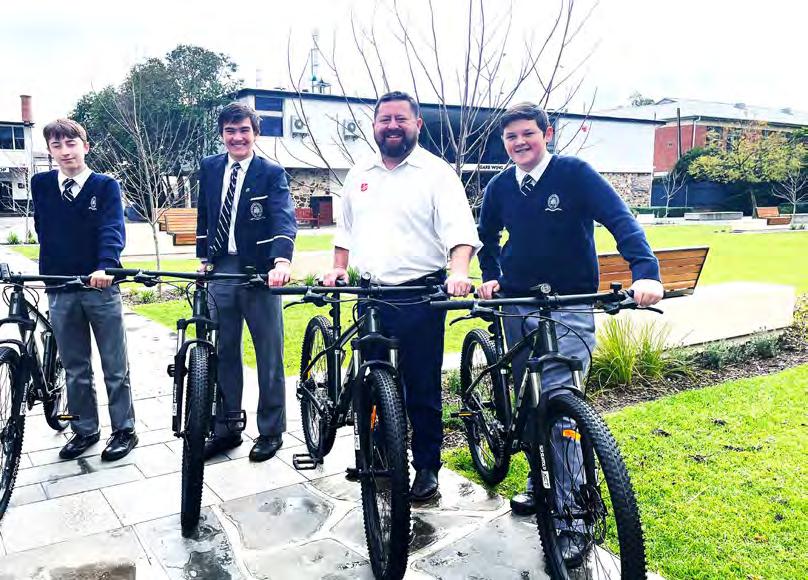
A local bike shop supported the bike-building program. Students had to work in small groups and build a bike from scratch. Once the bike shop gave the all-clear, the bikes were road-tested by the students and given to a Salvation Army representative.
Senior Chaplain for Anglican Schools (SA) Tracey Gracey said students honed their skills by working together and with people they had never worked with before. She said local businesses and service agencies were also included in the program to help those in need feel accepted, valued and included in society.
She said students such as Emma and Kristian who participated in the bike program valued the experience. “Building bikes was such a learning experience that made me realise how fortunate I am. I felt fortunate to be given the opportunity to help others and change their lives for the better,” Emma said.
Kristian said he found the bike building an enjoyable experience. “It made me happy to know that just building a bike for someone would change their life in a way we cannot understand,” he said.
The recipients of the bikes expressed their appreciations for the time and effort students spent building the bikes. One recipient said a bike was something they had always wanted but was unable to afford, while another recipient said the bike would greatly help with their dayto-day living and health.
Meanwhile, the cooking program not only fed those in need but also assisted a church community short on volunteers who were serving at the Saturday night dinners.
Anglicare generously offered their industrial kitchens so students could learn how to cook in a professional settingt and the head chef from a local restaurant gave up their time to teach the students about hygiene and kitchen etiquette.
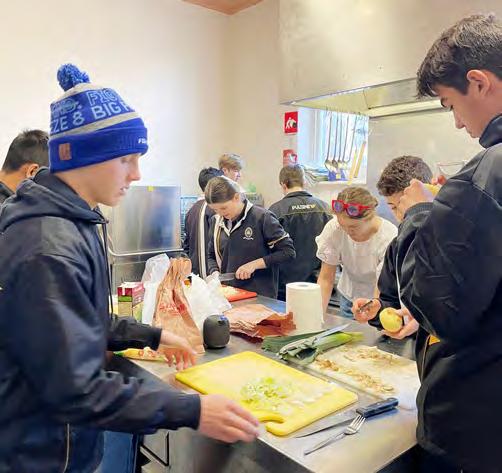
Students had to plan, purchase and cook a three-course meal. Students taste-tested the meals, then voted for meals that could be easily prepared and serve up to 100 people. It was like the feeding of the 5000 bible story as our students made enough meals for 500 people, which meant that we could donate takeaway meals to The Salvation Army.
One of our students who participated in our cooking program said: “Spending a week on the Amped program was a wonderful experience. We had to organise, budget, and cook a three-course meal for 100 people. It required teamwork with peers I don’t always work with and creative problem-solving. For me, it was something I will never forget, and it was truly a lot of fun and an eyeopening experience.”
On Wednesday 31 August, Trinity Anglican College celebrated R U OK? Day which is a big part of our annual program of events to support the wellbeing of our College community.
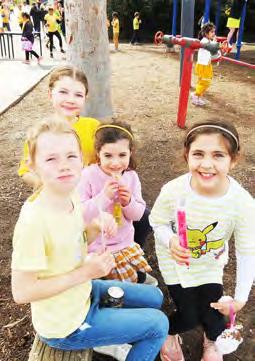
After weeks of rain, the sun finally came out and gave us all a chance to get out in the fresh air, enjoy time with our friends and talk about the importance of asking ‘R U OK?’
A brilliant display of yellow was on show right across our College with activities, in-depth discussions on mental health and the importance of connection and, of course, a delicious sausage sizzle for lunch coordinated by our Year 10 students.

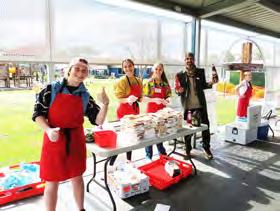
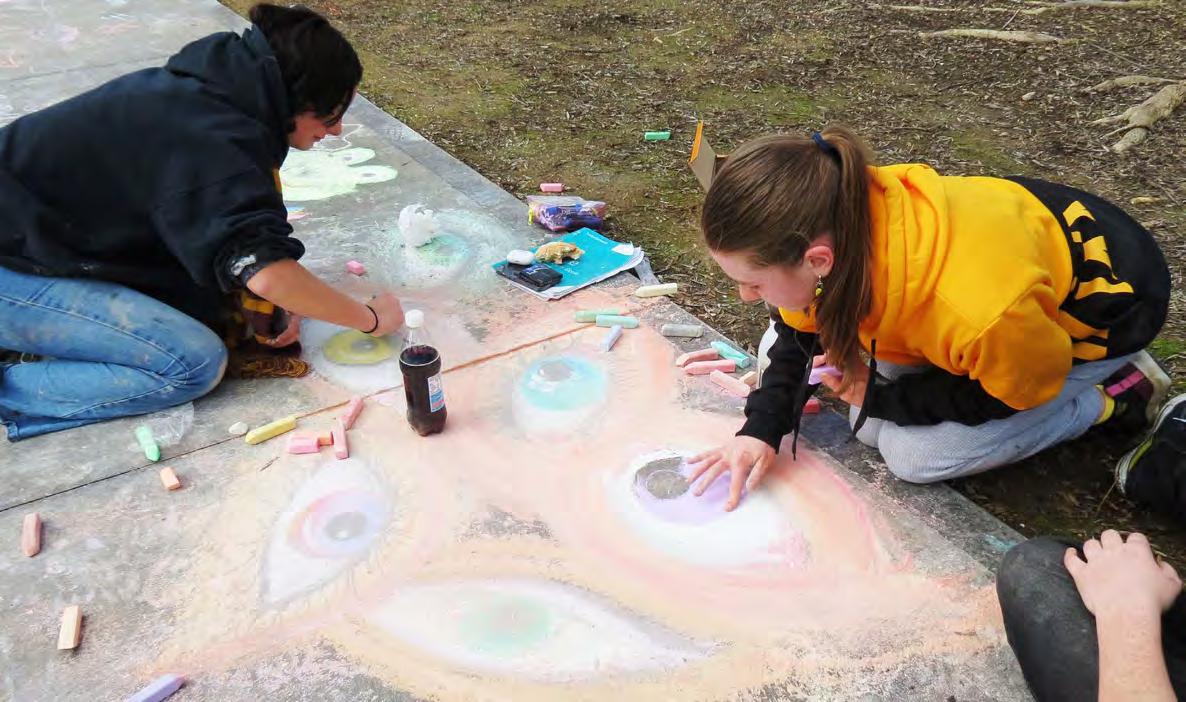
The 2022 theme of ‘You don’t have to be qualified to ask R U OK?’, was weaved into the morning Pastoral Care Group discussions used this as a prompt to reflect and focus on individual wellbeing. We also talked about how sometimes others may look like they are doing OK on the outside, but they really aren’t on the inside; and why it’s important to use our voice to help others when they might not be able to use their own.
Students participated in activities throughout the day that grew their capacity to notice signs and behaviours which might indicate someone may not be doing okay. There was football kicking on the oval, basketball competitions in the Multi-Purpose Hall, a photo booth with dress-ups and R U OK? Day props, plus fantastic footpath chalk artworks that brought together students from our Junior and Senior Schools in a beautiful display of what R U OK? Day meant to them.
Student wellbeing underpins all that we do at Trinity. Our Pastoral Care Program can be defined as our commitment to, and active demonstration of, concern for the growth and wellbeing of our students and the broader school community. It focuses on cultivating an environment and culture that supports every student’s physical, social, intellectual, emotional and spiritual development.
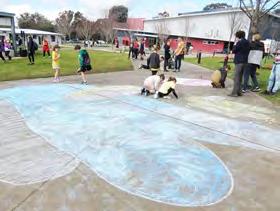

Inclusion must be a huge part of our Chaplaincy program at Shelford Girls’ Grammar as we are in the heart of Melbourne’s Jewish community, Caulfield. To call ourselves Anglican is even a stretch as I would say there are more practicing Jews than Christians amongst both students and staff. Because of this, it is very important to hold a balance between offerings of the gospel, and an awareness of other faiths and backgrounds. Chapel services must be welcoming places for all.
Our Chapel services often focus on the term ‘spiritual wellbeing’ rather than faith-based education and are run once a term for high school age students. Spiritual wellbeing is of course an extremely broad term that has surfaced within our community as a way to show inclusion. I hold onto hope for the many students who love walking over to St Mary’s Oaktree Church for Chapel Services and often describe the church as a ‘peaceful’ place. For many it is their first experience of church and I hope that feeling of peace helps to hold positive memories of church as they go through life.
The last two years I have worked hard to connect with and invite local Jewish organisations to come and speak, offering many Q&A style panels. This has worked well and has increased awareness and interest in Christianity too. Once you begin to open up dialogue about another
faith, questions of curiosity rather than condemnation of Christianity also follow. I’ve had many interesting conversations with students that began under the guise of asking about another topic like philosophy or Judaism and then suddenly they want to know more about Jesus! Yet, when specific topics on Jesus are shared there is seemingly little interest. I’m sure many of us face this - the joys of working with teenagers!
Inclusion of all faiths and secular ideologies must now be a major part of the Chaplaincy program at many schools who have drifted towards secular society and away from church heritage. However, it is amazing how even when this happens God is still working through this, prompting more questions through unexpected avenues.
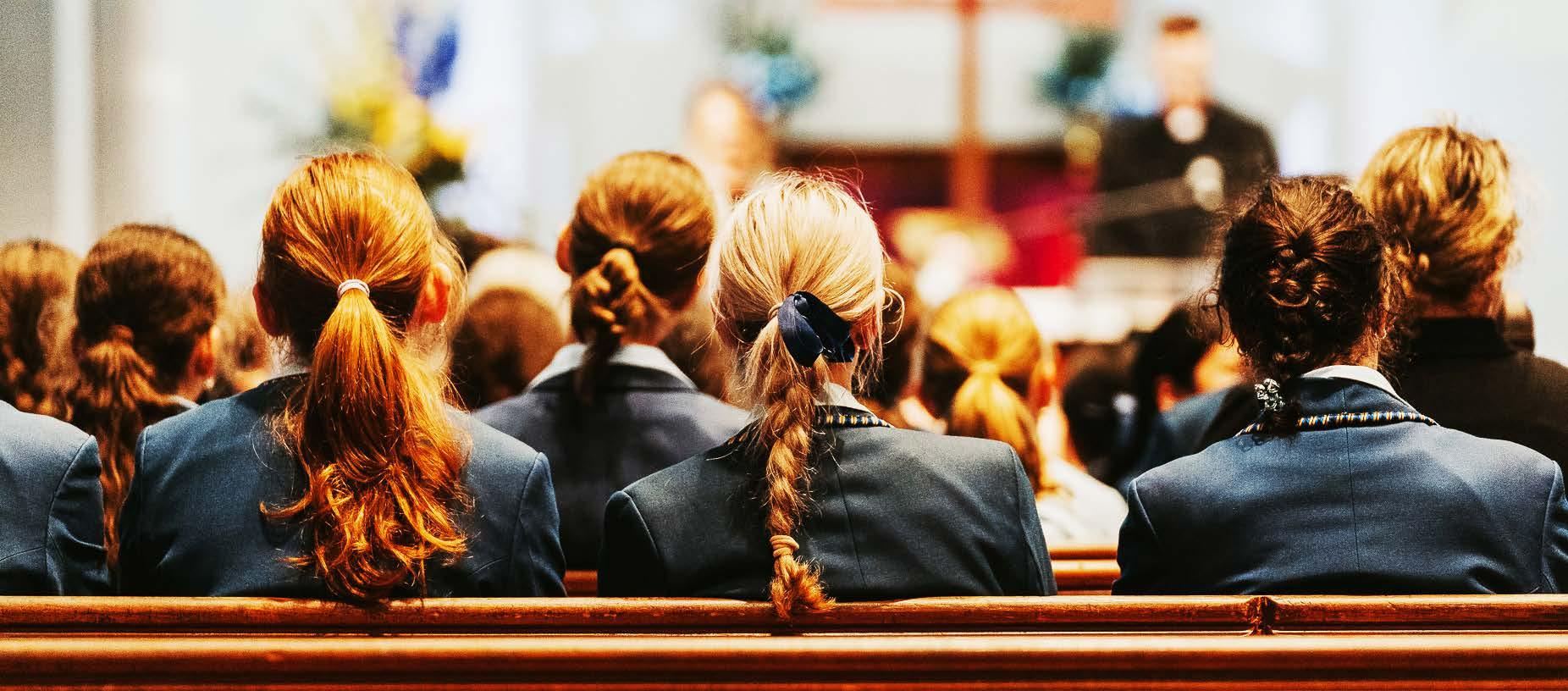
This year St Columba celebrates 20 years of outstanding education in the Port Macquarie region. Over the past twenty years, the School has grown to almost 1200 students from Kindergarten to Year 12 and is unapologetic in its desire to offer its students the very best education possible.
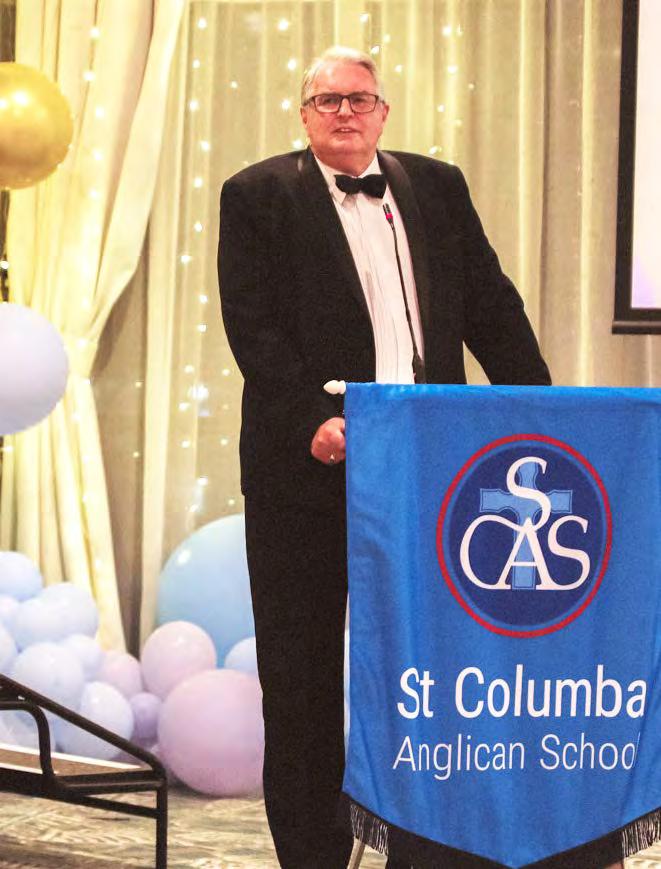
The Anglican Diocese of Grafton stretches from Port Macquarie in the south to Tweed Heads in the north in New South Wales and Anglican education in the region has a long history.
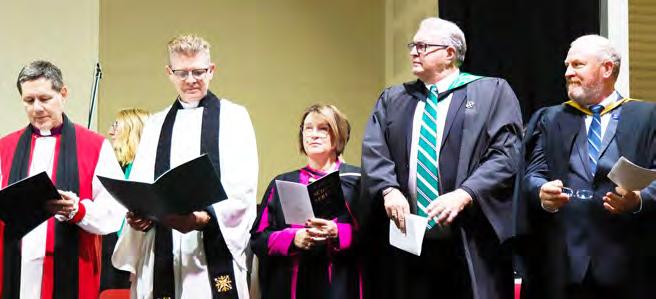
Education in Port Macquarie began in 1825 at the old historic St Thomas’ Anglican Church (fifth oldest in Australia) and ceased in 1865, following the NSW Public Education Act
Under the supervision of the The Reverend Thomas Hassall, a Church School with 56 pupils was established by May 1825. When St Thomas’ Church was opened in 1828, the school moved into the nave of the church and later into the old surgeon’s dispensary (now The Chapel) when it ceased to be used by the government medical officer.
With the establishment of the Port Macquarie Public School in 1867 and the withdrawal of State Aid, the Episcopal School closed down after forty years of service to the community.
Later St Thomas’ Church also pioneered and conducted a pre-school Kindergarten from 1950 to 1973, once again in the old dispensary until the new parish hall was built in 1961. This school closed down after twenty-three years of service to all denominations because departmental requirements would have rendered the building
unsuitable for use by church organisations.
In the 1980s and 1990s there were 27 parishes, together with four Anglican Schools, Lindisfarne Anglican Grammar School at Tweed Heads, Emmanuel Anglican College at Ballina, Clarence Valley Anglican School at Grafton and Bishop Druitt College at Coffs Harbour.
John Barrett was Chair of Committees in the Anglican Diocese of Grafton (for Synod and Bishop in Council) for a decade in the 1990s and was aware of the opportunities for mission and ministry within the already established Diocesan Schools. In 19he had discussions with the then Anglican Bishop of Grafton, The Right Reverend Phillip Huggins, and proposed the establishment of an Anglican School in Port Macquarie.
A public meeting was organised to gauge support for the proposal. The rest is history. St Columba Anglican School opened in late January 2002, with 76 students from Kindergarten to Year 7.
The Reverend Canon Dr John Barrett OAM went on to become the Foundation Chair of Council, a position in which he served up until his retirement in 2018.
To mark the 20 year milestone an Anniversary Gala dinner was held for the school community.
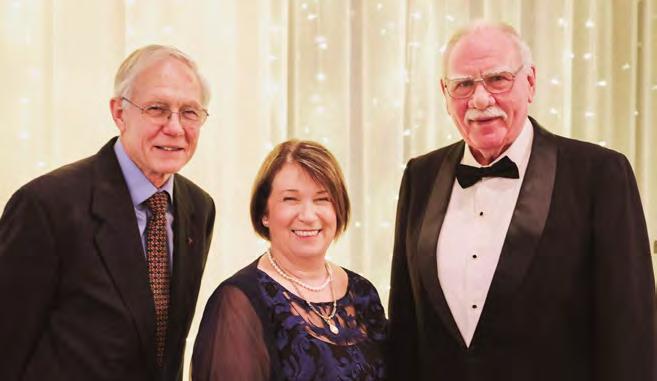
When asked how Inclusion relates to School values, Frederick Irwin Anglican School Principal Tracey Gray and Chaplain, Reverend James Tabor believe it’s an essential part of the Anglican ethos, particularly relating to the wellbeing of students at the School.
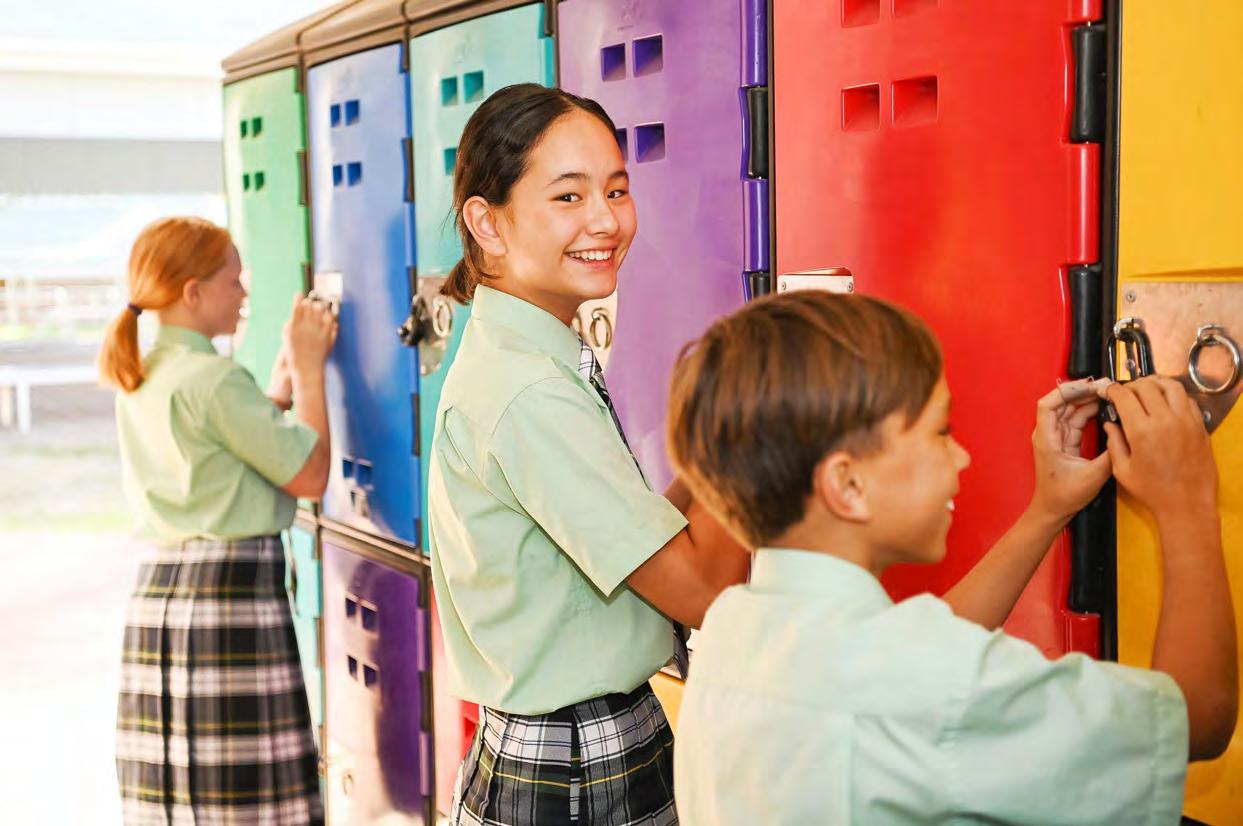
“Anglicanism has its roots in giving precedence to include and not exclude,” Reverend James said, highlighting how they discuss different religions as part of Christian Education including Islam, Judiasm and Aboriginal Spirituality in relation to the Noongar community.
Mrs Gray agreed: “We have now brought in Inclusion as one of our core values, and we are building a culture that includes everyone, this is an important part of the Anglican identity. Everyone matters, everyone is important,” she said.
“We want our students to engage, we want them to understand the diversity of our world. And inclusion is an integral part of this” Mrs Gray said.
“Our school is creating inquiring minds, supported by Christian values which will create future leaders who are understanding and loving to their fellow humans.”
“The students are learning to love and to listen, to recognise difference, and to not fear it.”
Woodcroft College does not just acknowledge the teaching of Jesus Christ, we celebrate them. We have a culture in our school that’s worth defending. The challenges of COVID have reminded us we are a people who perservere in faith, a people of grit, and capacity, a selfless community that has a strong spirit.
Firstly, being an Anglican Christian school means we all belong. All people belong, are made equal, deserve dignity, and have a future and as we are made in the image of God, we are made with value.
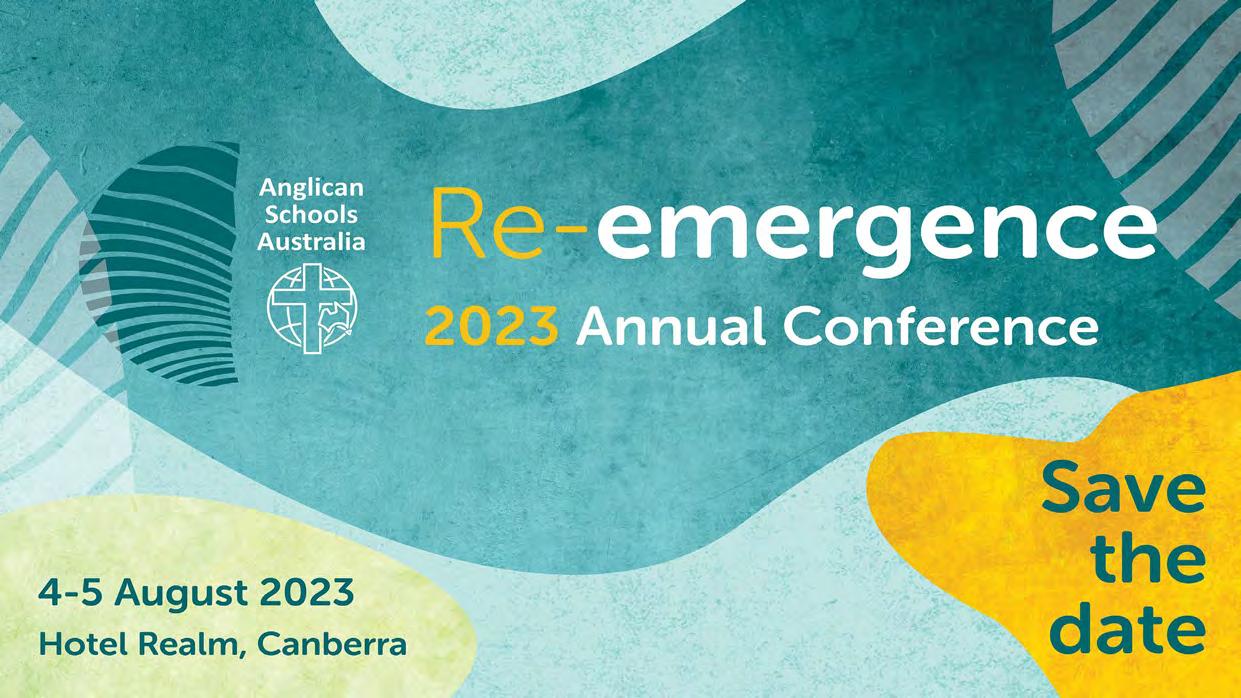
What unites us as Anglicans is we are independent. We all come with our own lens of faith and spiritual understanding, and we accept and celebrate our differences. However, if a sense of purpose is being questioned or absent, we encourage all to be a people not to put our own interests first but seek out the needs and interests of others. For even the Son of Man did not come to be served, but to serve.
As the College Pastor, all students from the ELC to the year 12 graduating class are invited to explore concepts of faith. Faith should only add to your life, not take away. Depending on whether you accept the Christian faith, we can still learn from the teaching of Christ.
Our identity is found in our character, at Woodcroft College we study the character and teaching of Jesus Christ and encourage all to find their own sense of belonging, dignity, value, and purpose. That’s finding your remarkable.

Phone: 08 9286 0290 Email: asa@anglicanschoolsaustralia. edu.au Web: www.anglicanschoolsaustralia.edu.au
